
Impartial training and careers advice
Call us: +441983 280 641
+441983 280 641

- How to become a Yachtie
So you’re thinking about becoming a Yachtie?
You may have a friend or relative who already works in the industry, or you have watched TV programmes like Below Deck , you know working on a yacht is the right for you, but where do you start?
With the potential to earn great money, travel, and work with loads of like-minded people, it’s not surprising this job ticks a lot of boxes for many people.
Becoming a Yachtie and getting paid to work on luxury yachts may seem like a job and industry that only the elite can have access to, or it just seems too confusing to start.
However, with an understanding of the requirements, certification, and having some expectations of what job role you should be looking for, starting work as a Yachtie will not seem so daunting.
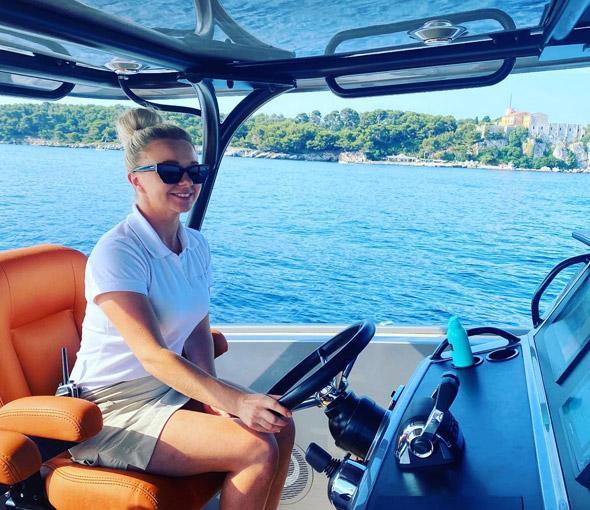

What is a Yachtie?
Before we go any further, let’s make sure we are all singing off the same hymn sheet.
A Yachtie is a broad term used to describe anyone who works on a yacht. More specifically, it has become the term for people working as yacht crew on superyachts.
A superyacht is a very large boat that is extremely luxurious and often owned by multi millionaires and billionaires.
These Yachties who work on superyachts hold a number of different positions. Most Yachties will start their superyacht career working as a Deckhand or Stewardess. With more experience and responsibilities, your role will change as you progress up the career ladder.
It’s worth noting there are other types of yachting and Yachties. The other kind of ‘Yachtie’ could describe those who hold their Yachtmaster qualification and have jobs like skipper charter boats.
Job roles for new Yachties
Yachties new to the industry (also known as ‘Green’ Yachties) will traditionally apply for entry levels roles, which are Yacht Deckhands or Yacht Stewardesses.
These are both very different jobs, so you need to be sure which one you want to do and start training for that career path.
Yacht Stewardess (Stew)
A Stewardess, or Steward , looks after the interior of the yacht. This means anything that happens inside the boat, you will be responsible for it.
Think of any job in the hospitality industry and then combine it into one role on a yacht, that is what you will be doing.
From making beds, doing the laundry, cleaning, serving food, and hosting dinner, you will do it all to a 5-star standard. Anything less than perfect, and your guests won’t be satisfied.
It’s the small things that make the difference between high standards and exceptional standards. You must have a great eye for detail and be able to make sure no stone is left unturned. Everything on board the ship must be 100% perfect at all times.
You will be reporting to Chief Stew, who will be your manager and give you your task list. After a good few seasons as a green Stewardess, you will have enough experience and confidence to apply for Chief Stewardess roles.
Yacht Deckhand
In contrast to the Stewardess role, Deckhands look after the exterior of the boat.
Predominantly a male role, Deckhands will do everything from general maintenance to cleaning the teak deck, looking after the toys (Jet Skis, etc.), and even driving the tenders.
Deckhands should know how a yacht operates, the basic terminology used onboard, how to tie knots, and loads and loads of enthusiasm.
Deckhands may also dip in and out of helping the Stewardesses, and it isn’t uncommon for Deckhands to give a hand during busy evening meal preparation and service.

5 steps to Becoming a Yachtie
With an understanding of the job roles available, you can now decide which one best suits you. With the right attitude, qualifications, and knowing where to look for work, becoming a Yachtie is achievable for anyone who wants it.
- Have the right attitude
- Pass an ENG1 medical
- Complete STCW Basic Safety Training
- Gain experience
- Go to a superyacht marina
1. Have the right attitude
Along with gaining the correct qualifications to prove your competence, to become a Yachtie, you must have certain characteristics to thrive in this industry.
Yachties have to be well presented, articulate, know how to take orders, and be able to work hard, all with a smile and enthusiasm. You have to be able to work incredibly long hours, sometimes under stressful conditions, without losing your patience.
Having a job on a superyacht may sound glamorous, but if it’s your 10th day working in a row and you’ve got your head stuck down a toilet trying to clean it, you may want to think again. To become a Yachtie, you have to be happy with spending a lot of time away from home without seeing your friends and family. This may all seem obvious, but this situation does not suit everyone, and without careful consideration of the negatives, you will leave this industry quicker than when you arrived.
2. Pass ENG1 Medical
The first actionable step you need to take to become a Yachtie is gaining an ENG1 medical certificate. The ENG1 medical is an examination by an approved MCA (Maritime and Coastguard Agency) Doctor to make sure you are fit and able to work at sea.
Every single person working at sea must have an ENG1 medical certificate , without this, you are not able to start working on superyachts. The examination will take around 45 minutes, during which the doctor will go through a checklist to make sure you have no underlying health conditions that may impact the safety of you or anyone else on board the ship.
The most common reason new yachties fail the ENG1 is colour blindness. Surprisingly many people can go through their whole life without knowing they are colour blind. However, on board a ship, this can have huge implications. If you cannot identify signals and lights correctly, it will be impossible for you to help navigate the ship in an emergency. Unfortunately, this means you cannot start work as a Yachtie.
3. Complete STCW Basic Safety Training
Another requirement for working at sea is completing STCW Basic Safety Training . Similar to the ENG1 you can only get a job on a yacht if you have the STCW certificate.
STCW stands for ‘Standards of Training, Certification and Watchkeeping’. It is to make sure that all Seafarers have an understanding of what to do in an emergency and are aware of the procedures required.
STCW Courses are action-packed and quite a bit of fun. From fire fighting to sea survival, you will get stuck in learning, and learn loads of new skills.
4. Gain experience
If you are lucky enough to have a job offer on a superyacht, then having your ENG1 and STCW certificates will be enough.
Don’t worry if you haven’t already got a job offer, it’s quite normal to go through all these steps and not have a job lined up yet. If this is the case, gaining more experience and qualifications is a good idea to give you a competitive advantage over anyone else applying for the same job role.
This is achieved through signing up to a Deckhand or Stewardess Course. On these courses, you will get your standard STCW certificate and a list of extra qualifications demonstrating your competence, ability, and commitment to the industry.
Deckhands will learn how to drive a small yacht, engine maintenance, general yacht repair, and how to clean teak properly. Stewardesses will understand wine and how to serve it, the art of flower arranging, and how to drive a powerboat.
5. Go to a superyacht marina
After you have completed your superyacht training, now is the time to head out to France and look for work. Along with signing up to yacht crew recruitment agencies, going to one of the main superyacht marinas and handing out your CV to Captains is a great way to find work. This is known as dockwalking.
If you complete your Superyacht Course with us, you will have the option of signing up to our recruitment day in Antibes, France. We head out to France as a group, talk you through the process and offer you our industry contacts.
This is a great way to start your journey, and all our students find work in no time.
How much do Yachties make?
So you’ve heard you can make a good amount of money working on superyachts? Along with the travel, the great salary is why many people decide to become a Yachtie.
Like a job within any industry, salary varies. A Superyacht will agree on a crew salary budget with the owner of the yacht.
If you are just starting out, you can expect a salary of around €2,200 – €3,200 per month. However, the industry standard is €2,500 per month. Once you gain more experience and qualifications, your salary will increase.
When you look at the salary at face value, it looks great but not incredible, however when you are at sea, you have zero outgoings. Working on a yacht means you don’t have to pay rent, bills, or buy food which will save you heaps of money compared with working at home.
If you want to see the salaries of all yacht crew, check out our Salary Guide.
Do Yachties pay taxes?
Another reason why the salary is so appealing is that in most cases Yachties don’t have to pay tax.
This is a government scheme called the Seafarers Earning Deduction , and providing you are eligible, Yachties can keep 100% of their earnings.
To be able to apply for Seafarers Earning Deduction, you must be working on a ship outside of UK waters for a period of 365 days. This doesn’t mean you have to spend a whole year at once away from home, rather you can only apply once all the days you work on a yacht adds up to 365.
Being able to understand this tax scheme will be hugely beneficial before you start working on a Superyacht.
Download our free Guide
Want to know more about working on a Superyacht, please download our free guide .
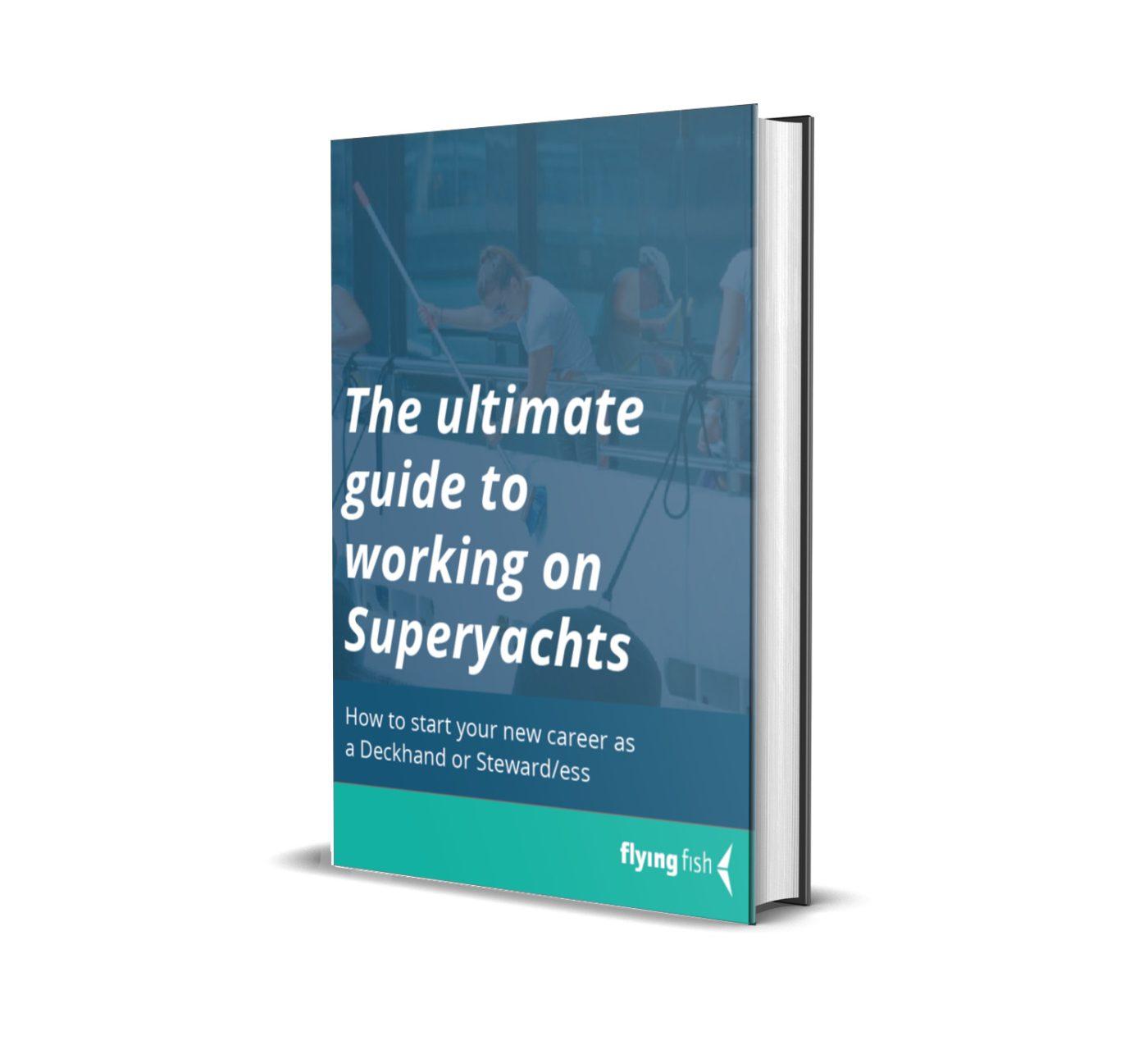
Related articles

- Seafarers Tax
5 ways to ensure your SED claim is rock solid
The Seafarers’ Earnings Deduction, often referred to as the SED, is a tax legislation that enables seafarers to claim back their UK income tax. It a...

Do I need to pay off my Student loan if I work on a Superyacht?
Good question! First, let me say that the information below is aimed at people who have studied in the UK and took out a Student Loan to cover course ...

Have I got the right experience to work in yachting?
If you’re thinking about working on board a Superyacht, we share the skills and experience you need and how to get into the yachting industry in thi...
- Yachting for beginners
- Owning a yacht
- Motor Yachts
- Sailing Yacht
- Indian Ocean
- Mediterranean
- Buying or Selling a Yacht
- Yachting Events
- FAQ – Luxury Yacht Charter
- FAQ – Buying a Yacht
- FAQ – Sell your Yacht
- How Much Does It Cost To Charter A Luxury Yacht?
- All our Blog Post & News

Yacht crew positions : Hierarchy, Missions & Salaries explained
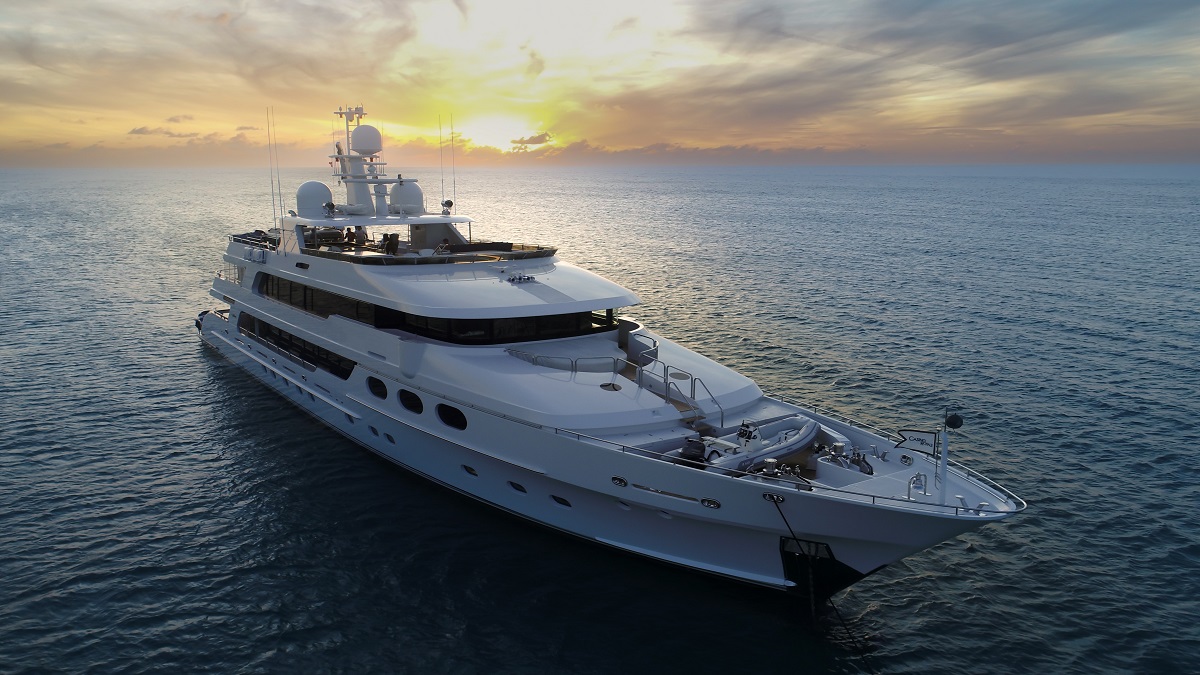
Like any well-run hotel, restaurant, or other luxury service, a crewed yacht needs organized structure and good management. Whether you’re staffing your own luxury vessel or looking for an exciting career working and traveling the world, you need to know how this structure works, and what you can expect to pay or earn and do in the various roles on board.
Every yacht is a little different, and organization may reflect the style of the captain or the demands of the owner. But the same jobs need to be done on almost every boat. Organized with ranks, heads of each division report to the Captain. It’s not a military-style organization, but there are parallels with merchant marine grades and structures.
Smaller yachts need fewer crew, and staff may wear multiple hats that cross more traditional divisions and may combine some jobs with others. Large yachts have more distinct divisions or subdivisions, with more specialization to divide tasks and manage staffing. The core skills are the same, but finding staff with the right blends to do the jobs is key. Crew with broader skills are highly sought after.
As a yacht owner, you shouldn’t have to worry about day-to-day management decisions or organizing all this. That’s why you have a captain, and it’s better to leave staffing decisions entirely up to him or her. But it’s still important to know what it is people you’re hiring do, why they’re there, and how many you need. You don’t want too many crew, or to be short-handed. An understanding of what your yacht needs helps you talk to the captain to keep your yacht running how you want it.
For those looking to break into yacht crew work, consider your skills and strengths, and what jobs appeal to you. You’ll need training before you work, and you can direct your job path through the training you seek. Your goal is a suitable position on a well-run yacht, so make yourself the most attractive candidate possible.
Yacht Work Life
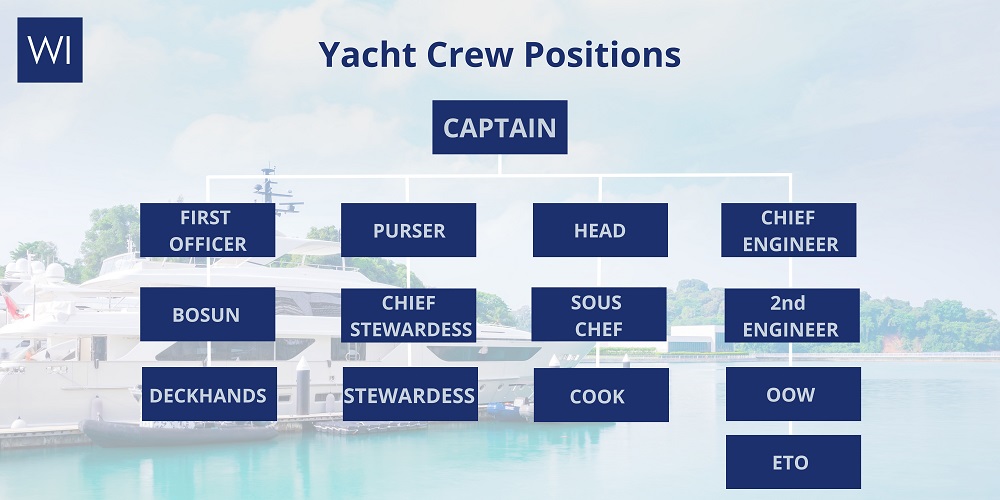
Working on a yacht is also living on the yacht. Crew must have a space to sleep, food, and all the basics that any employee needs. Large yachts have space reserved for crew, and owners looking for quality crew should provide good working and living conditions. Your crew takes care of you, and you should take care of them.
Depending on where a yacht operates or what flag she flies, a variety of labor laws or rules may be in effect. These requirements may be for work visas, contracts and written agreements, and compliance with merchant and ship crew treaties and laws. Be prepared to have work and non-disclosure agreements between yacht and crew, though a few yachts skip this.
Seasonal Jobs
Many yacht positions are seasonal. Year-round employment is more likely for senior crew like the captain and department heads, but not all yachts see year-round use. And some yachts may use different crew in different locales between seasonal moves.
Any job listing should give seasonal information, with geographic information, the length of the season, and the prospects for year-round positions and repeat employment.
Hours, Salaries, and Expectations
Yacht crew is a service job at its core, and every yacht owner is looking for service-oriented people who understand how to deliver a hotel-quality living and restaurant-quality fine dining. Work experience in luxury hotels and restaurants is a big plus for some jobs, and makes breaking into yacht work easier.
Yacht work can be very demanding, with periods of intense work when the owner and guests or a charter party is on board. Long days aren’t uncommon, but often balance with slack time when the boat is empty of passengers. There is always work to be done, but there’s usually a chance for time off.
Most salaries are monthly, since many positions are seasonal. Pay ranges are commensurate with experience, rank, and responsibility. Private vessels usually offer higher base pay, as charter crew can earn tips on top of their base salary. Because of the demands of the lifestyle, compensation is good and you have minimal living expenses on board.
Benefits and Time Off
Because so many jobs are seasonal and may occur in different countries and locations, benefits offered to yacht crew vary widely. But it is not uncommon for crew to be offered health and accident insurance and a flight to the vessel. Living on board, you’ll get food, rooming (usually shared), basic toiletries, uniforms, and laundry. Yachts with a longer view may offer additional training to long-term prospects.
Time off is usually linked to boat use, and may be sporadic in-season or when the boat has the owner and guests on board. There will always be some time off, but it may be between very intense work periods.
Most crew jobs have an employment contract that meets the Maritime Labour Convention 2006 (MLC). This should spell out the contract period and duration, as well as salary, leave and time off, probationary periods, repatriation policies, and any other crucial details to meet the minimum international standards of crew welfare.
This contract should also contain shipboard policies on confidentiality and non-disclosures, drug and alcohol use on board, personal hygiene expectations, interpersonal relationships, and dispute resolution. Job expectations and requirements can also be included, with specific language about roles, tasks, and cooperation between divisions.
Note that all crew agreements will explicitly prohibit drug use on board, most limit alcohol consumption and ban hard liquor on board, and many boats have policies prohibiting intimate personal crew relationships. Because the crew is living on board full time and in close quarters, rules to maintain decorum and crew harmony may be in writing.
Training & Certificates
Two key certifications are required for yacht crew. Employers look for the STCW (Standards of Training, Certification and Watch-keeping for Seafarers) and the ENG1 (Seafarer Medical Certificate). Insurers generally require crew to have these two certifications or the equivalent.
The ENG1 isn’t a class. It’s a medical exam to ensure that the crew is physically fit to serve at sea and has no underlying conditions that may arise far from help. It’s best for prospective crew to secure the ENG1 before investing more time and money training.
STCW is a week-long class on the basics of onboard safety. This includes hands-on modules covering personal survival, fire safety, first aid and CPR, accident prevention, and security awareness. It needs to be refreshed every five years.
Shared, Hybrid, and Crossover Jobs
Larger vessels will have more defined duties and specific areas of responsibility. But smaller yachts may want the crew to have different roles in different situations. For example, a hybrid job description may read “3rd Engineer/Steward” and describe a role in engineering when the boat is empty but on inside crew when passengers are on board.
When hiring or seeking jobs be prepared to look for creative crossover skill sets to meet the needs of the vessel.
Extra Skills and Duties
Any extra skills outside the regular duties makes crew more attractive. From stewards who can teach yoga, give massages or play cocktail piano to deck crew who know how to water ski, SCUBA dive, or fish, anything that crew can bring to enhance the passenger experience adds value to the employee.
If you’re looking for a position, list the skills you’d be comfortable using. If a vessel owner is looking for something specific, spell it out and figure out how that special duty fits into the employee work day.
The Four Main Divisions

Most yacht crews break into four primary divisions which group related tasks and responsibilities together. While the grouping sounds like it’s by section of the boat, they’re really more functional. For example, stewards (Interior) will definitely serve meals, whether they’re in the main dining room or out on deck. Deckhands (deck) are going to be involved in painting, sanding, and varnish jobs anywhere on the boat.
The deck crew handles most of the exterior operations of the yacht, and runs it. Deck hands and crew keep the boat looking clean and shiny, and handling most vessel operations. This includes driving and operating the yacht, navigation, running all launches and ship’s craft, handling lines, and all maintenance and painting, washing, and shining.
2-Interior (or Inside)
Inside crew are primarily the stewards and housekeepers. Larger vessels will have a dedicated housekeeping staff separate from the stewards, but smaller vessels may not.
Stewards keep the interior clean, do all housekeeping, laundry, food and beverage service, cabin preparation, and anything else needed for the comfort of the passengers.
3-Engineering
Below decks, the engineering department ensures the safe and smooth running of all the ship’s machinery and electronics. Engineers are engine and systems specialists, and there will usually be a dedicated electronics expert. Most engineer jobs require professional training and certification.
Fine dining is a hallmark of the yachting experience, and a full-time galley crew prepares all meals for passengers and crew. The head chef plans the menus and provisions the boat, while junior chefs assist the head chef with meal preparation and keeping the galley spotless.
Yacht Job and Department Details
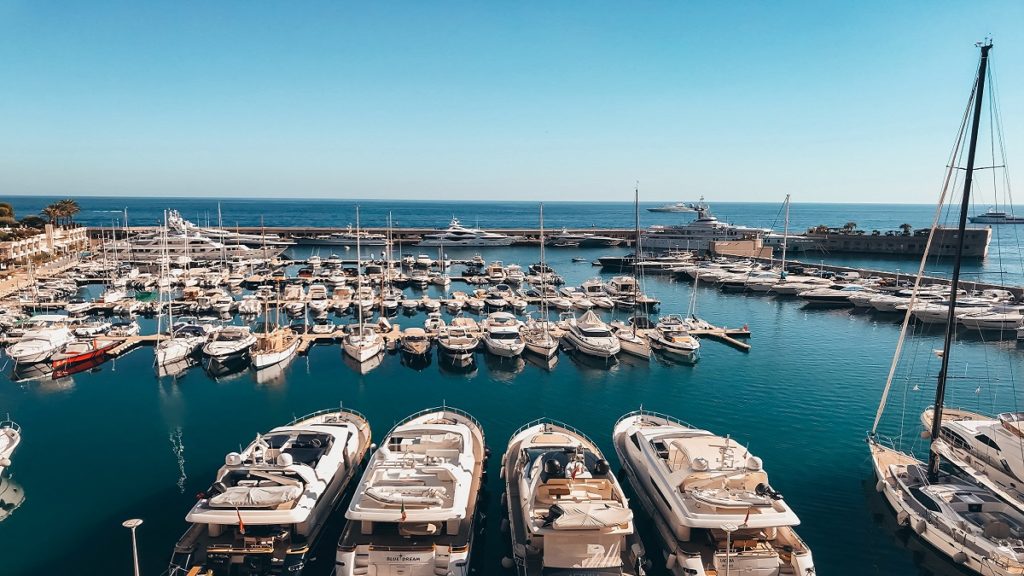
Departments are all organized in a hierarchy, with a department head reporting to the Captain. The clear chain of command makes for smooth operations, with all communications going up and down ranks. Junior staff will occasionally take instructions from other divisions as all crew is expected to help as needed. A captain or department head may organize staff differently, so reporting structures listed are guidelines only.
All salary ranges are monthly figures and are ranges based on yacht size and crew experience. Senior jobs on larger yachts have more responsibility than the same job title on yachts with smaller crews. Experienced crew are very desirable and can expect more pay for their positions.
Listed responsibilities are not exhaustive, and different yachts may allocate some jobs to different positions.
Read also: The yacht charter experience ladder
The Captain

The captain of the vessel is the overall decision maker for the yacht in all situations, including the safety of the vessel. The owner should leave the Captain responsible for operational decisions about hiring and staff and operating the ship. To become a captain requires years of experience and training, and a broad set of skills including yacht operations, personnel management, budgeting and finance. The captain works directly with the owner and owner’s representative, if the captain is not also acting as the representative.
On an organization chart, the Captain is usually placed in the deck division, but the Captain is always the senior-most crew on the yacht and all division heads report to the Captain.
Responsibilities include:
- Responsible for all navigation and running the yacht.
- Senior decision maker on all crew hiring.
- Manage repairs, refits, and yard work.
- Manage budgets and accounting. On larger yachts, this task ends more on the Purser, but the captain is always responsible.
- Ensure all paperwork, clearances, and legal requirements are completed.
- Primary contact with the owner or charter parties.
Reports to: The yacht owner
Salary Range: $6,000 to $22,000
The deckhands handle all the outside responsibilities of the ship, including cleaning and maintenance of the yacht and all the ship’s vessels and toys on board. Deck crew will have significant contact with passengers in this role, operating launches and delivering guests to and from shore and handling the toys.
All deck crew have watch responsibilities on passage, and daily responsibilities keeping the yacht pristine and clean. They will also do line handling and secure the yacht.
Deck department : Chief Mate/First Officer
The Chief Mate or First Officer is the second in command of the vessel, and left in charge when the Captain is not on board. The first mate has the requisite skills to stand in for the captain and run the yacht if needed and usually acts as the division head of the deck team.
The seamanship skills needed are similar to the Captain’s position.
- Primary safety officer for the yacht and all passengers and crew.
- Supervise and manage all operations on deck.
- Bridge watches on passage.
- Passage planning and navigation.
There may be additional mates on larger vessels, these 2nd, 3rd, etc. mates have similar responsibilities on rotation. But the first mate is senior and always second in command.
Reports to: Captain
Salary Range: $4,000 to $9,500 (First mate)
Second and more junior mates may earn $2,000 to $4,000
Deck department : Bosun
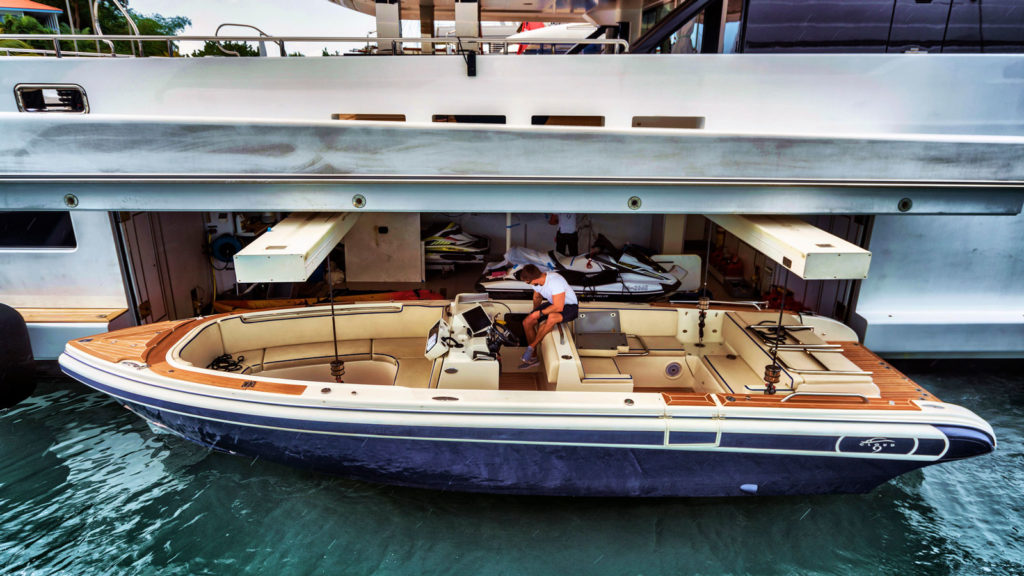
The Bosun is the senior deckhand and manages the junior hands on board. This will usually be the most experienced hand on board.
- Organizing all operations on deck.
- Coordinating the use, storing and launching of the ship’s boats, toys, and equipment.
- Managing the passerelle, watching passenger safety.
- Contact point for guest service on boats, toys, and trips to shore.
Reports to: First mate
Salary Range: $3,000 to $5,000
Deck department : Deckhands
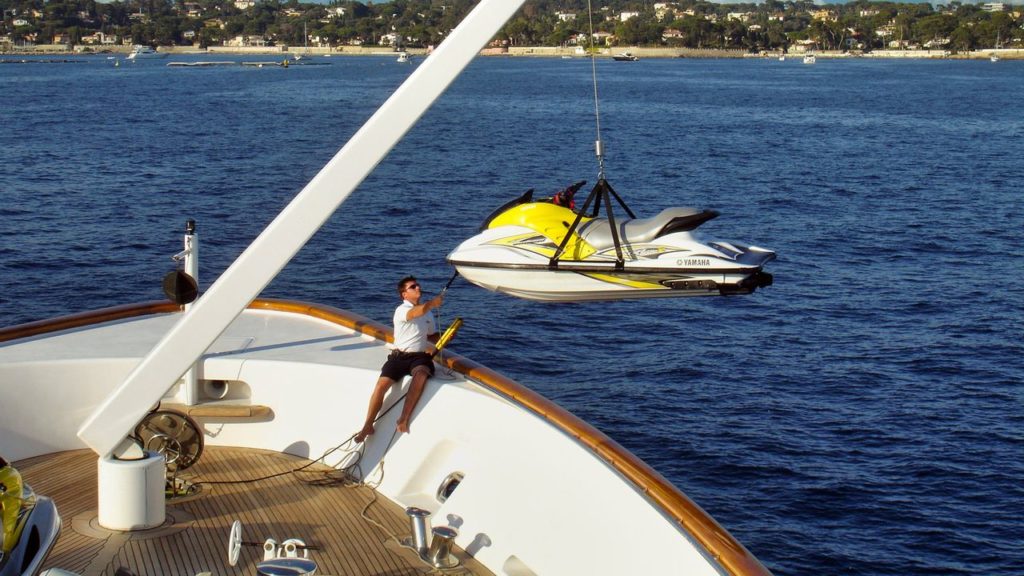
Deckhands are constantly busy with maintenance, cleaning, polishing, and assisting guests as needed. They will assist other departments as needed or given special duties.
- Daily cleaning of the yacht’s exterior.
- Painting, varnishing, polishing.
- Line handling.
- Launching and operating dinghies and tenders.
- Repairs and carpentry.
- Helping guests as needed – everything from handling baggage and gear to embarking and disembarking.
Reports to: Bosun
Salary range: $1,300 to $3,000
Though every position on a yacht is service-oriented, the interior or inside crew provides the primary customer service. They will interact the most with the passengers daily, and they’re directly responsible for the quality of their experience on board.
Interior department : the Purser
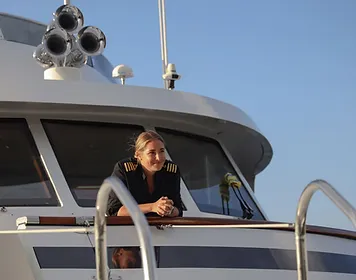
The purser is the chief financial officer of the yacht and handles all the financial operations on board. Accounting, purchasing, payroll and hiring, and all money matters end up with the Purser. This is a senior staff position, and may be the interior department head. Smaller yachts may eliminate the purser’s job and add it to the captain’s and other senior staff duties.
Responsibilities Include:
- Accounting and bookkeeping for all financial transactions.
- Human resources and payroll.
- Handling logistics for all departments related to purchasing.
- Managing contracts.
- Event coordination, including off yacht bookings and payments.
- Primary administration of the boat’s business paperwork.
- Inventory and supply management.
Salary Range: $4,000 to $8,000
Interior department : The Chief Steward/ess

The chief steward or stewardess has primary responsibility for all service roles inside. Food and drink service, cabin preparation, and anything to do with helping the passengers be more comfortable and enjoy their stay. The chief steward will be inside crew with several years of experience.
The chief steward manages the interior staff, setting and enforcing vessel service standards. The chief steward ensures the crew delivers a five-star hospitality experience.
Chief Steward Responsibilities:
- Scheduling and training junior crew for meal and drink service and cabin preparation.
- Primary contact with guests for meals and drinks.
- Sommelier and wine service.
- Coordinate with the galley for meals and presentation.
- Decorate the interior, from flower arrangement to table settings.
- Arrange onshore activities and outings.
Reports to: Captain or Purser, depending on the yacht
Salary Range: $4,000 to $8,500
Stewards/Stewardesses
The stewards and stewardesses are the primary guest service staff. They will work closely with guests and passengers, and have daily contact with them as they meet most of their needs while on board.
Steward Responsibilities:
- Food and drink service.
- Room preparation and turndown service.
- Cleaning, polishing, housekeeping, and inside maintenance.
- Cabin detailing.
- Laundry, pressing, and folding.
- Help with outings, trips, debarkations.
Reports to: Chief Steward
Salary Range: $1,500 to $4,500
Housekeeping

Larger yachts may have a dedicated housekeeping and laundry staff. This will be part of the inside crew, under either the purser or the head steward. There may be a senior housekeeper, if there are more than one housekeeping crew on board.
Responsibilities are the cleaning and laundry portions of the steward’s job, and a laundry steward may spend most of her time inside the ship’s laundry.
An experienced Head of Housekeeping may earn from $4,500 to $7,000, while a Laundry Steward typically earns from $2,500 to $3,500.
Read also: CAN OWNING A YACHT TO CHARTER (REALLY) BE PROFITABLE?
Food service requirements on any yacht are high. Whether it’s a privately owned vessel or a charter, the expectations are always for top tier food service, with a variety of meals planned for the requirements of every passenger. Chefs and cooks prepare all meals on board for passengers and crew, but sometimes other interior crew may help with prep work or cleanup.
Smaller yachts have smaller galley crews, but the largest vessels may have an executive chef and several sous chefs. All chef positions require formal culinary training and experience, but cook positions are often entry level. Promotion from cook to chef is unusual without additional training.
Galley department : the Head / Executive Chef

On larger yachts, an Executive Chef will run the entire galley with the help of sous chefs and cooks. With an Executive Chef, there’s an expectation that the food and menus will be on a level with Michelin star-rated restaurants.
The executive chef brings a thorough understanding of food preparation and presentation, and moves food preparation past creative up to artistic. Job responsibilities are similar to a chef, but the job demands and the required experience and education are much higher.
Salary range: $7,000 to $11,000
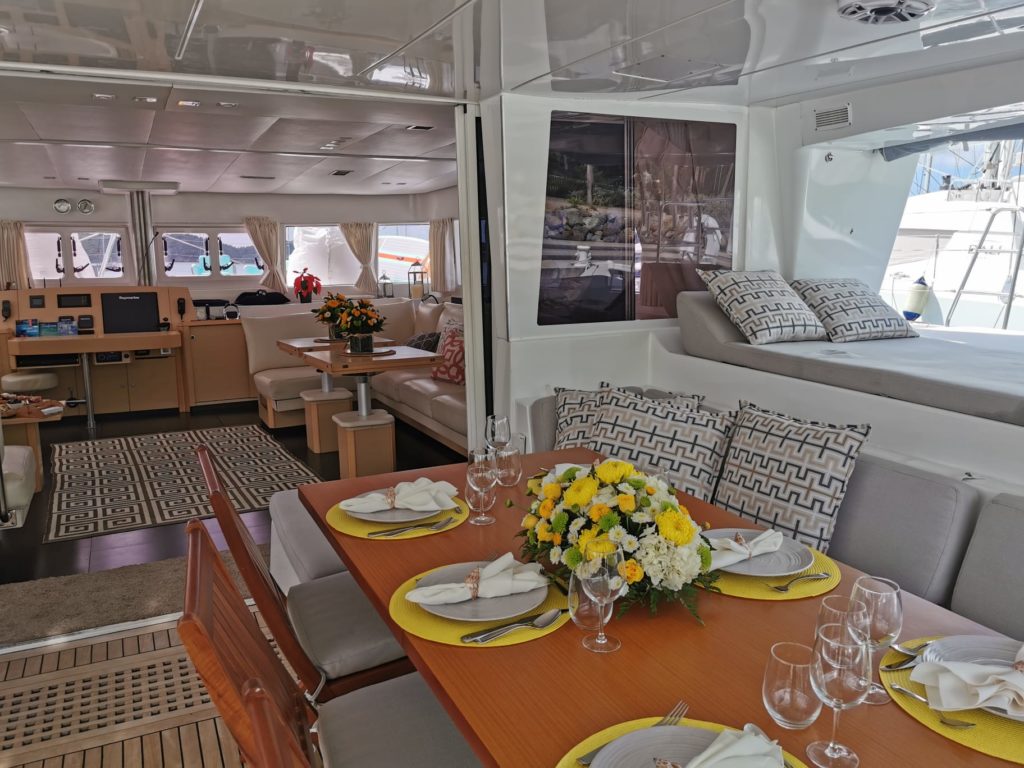
The chef has overall responsibility for all meals on the yacht, from provisioning in remote places to hygiene and good safety. If there’s only one chef, she’s the head of the galley crew. Finding the best provisions in far away locations and making the best of local food availability is a major part of the job.
- Planning a delicious and varied menu for passengers.
- Sourcing all food and arranging transport to the yacht.
- Maintaining and operating within the galley budget.
- Preparing passenger meals with professional presentation and style.
- Cleaning and maintaining galley and galley equipment.
- Deliver menus and meals on time, while running an organized and spotless galley.
Galley department : Sous Chef
The sous chefs assist the chef in all aspects of running the galley, and may have independent assignments to plan and guest and crew meals. While not primarily responsible for provisioning, the sous chef will help with food selection, menu preparation, and planning. A sous chef must have formal culinary training.
Reports to: Head chef
Salary Range: $3,500 – $6,000.

Galley department : The Cook
Cooks may be entry-level positions or experienced, but do not require formal gastronomy education. They will assist the chef and sous chefs, cooking meals and dishes for guests and crew, helping with provisioning, and keeping the galley neat.
- Assist with provisioning and buying high-quality food from local sources.
- Follow all food handling and safety guidelines.
- Assist the head chef as needed, taking direction and guidance.
- Prepare guest and crew meals as required.
- Staying on top of galley inventories and supplies.
Salary Range: $2,500 to $3,500
Engineering

The engineering department keeps the yacht and all its systems working. Whether it’s the engines, electronics, air conditioning, or the plumbing – it’s up to engineering to keep it running.
There is considerable overlap with commercial shipping in the engineering field, as many of the same skills apply. And there is a broader range of qualifications and grades based on the size and power of the vessel. Job ratings may be set by required experience based on tonnage of ship or power of engines, with corresponding levels of pay and responsibility.
Unlike commercial shipping, engineers may get involved in other aspects of running the yacht, like helping with docking and water sports with mechanical toys.
Engineering certifications, training, ratings, experience and licensing are critical to hiring competent engineers, and for engineering crew it’s an important facet of career advancement. This is important for Chief and 2nd Engineers, which are often broken out by MCA (U.K. Maritime and Coastguard Agency) rating or other international equivalent.
MCA ratings for engineers Commercial and Private Yachts over 24m are:
Y4: Less than 200 Gross Tons and less than 1,500 kW engine power Y3: Less than 500 GT and 3,000 kW Y2: Less than 3,000 GT and 3,000 kW Y1: Less than 3,000 GT and 9,000 kW
There is also an unlimited rating for merchant vessels larger than the Y1 category. For discussing salary and responsibilities, we will include all ratings in one position description, but pay scales with the size of the yacht and any required higher ratings.
Chief Engineer
The chief engineer manages all aspects of keeping the yacht and its systems running. The chief engineer manages all the engineering staff, and directs all maintenance, repairs, troubleshooting and upgrades. This is a management position, but requires extensive hands-on technical experience and knowledge. Chief engineers on large yachts hold an MCA Y1 or Y2, smaller boats will have a lower rated chief and a smaller staff. Check Jooble.org to find abroad marine engineer vacancies.
- Provisioning, shopping, and stocking.
- Preparing passenger and crew meals.
- Following instructions and cooking under the direction of others.
- Galley cleaning.
- Follow food safety and storage procedures.
- Food pre-preparation.
Salary Range: $6,000 to $15,000
2nd Engineer
The second engineer is also a highly skilled position requiring a rating or license and several years of experience. This senior level engineer also needs knowledge of how to troubleshoot and maintain all yacht systems.
- Maintain and manage all engineering operations.
- Hire, train and supervise all engineers.
- Project manage all upgrades and retrofits, including managing budgets, contracts, and suppliers.
- Coordinate maintenance schedule for the entire yacht around the usage and seasonal schedules.
- Maintain costs and accounting for engineering operations.
- Design and handle all safety operations.
- Set and maintain standards for operations and cleanliness in the engine room.
Reports to: Chief engineer
Salary Range: $5,500 – $10,000
OOW (Officer of the Watch) Engineer
The OOW is a junior engineering position, but still licensed. There are two categories of OOW – MEOL (Marine Engine Operator License) and the more junior AEC (Assistant Engine Course). The overall responsibilities are similar, working to support the senior engineers and handle independent assignments. The AEC rating is entry level for licensed crew, but has training and certification.
- Support the chief in all projects.
- Maintain a clean, safe engine room.
- Perform all maintenance, troubleshooting and repair tasks as needed.
- Support motorized water sports.
- Occasionally assist with other vessel operations, like line handling.
Reports to: Chief Engineer
Salary Range, MEOL: $4,500 to $6,000 Salary Range, AEC: $2,500 to $3,500
Electronics/Technology Officer (ETO)
The ETO takes responsibility for all audio-visual and information technology on board. Ensuring passengers have access to the internet, movies, television, and music is a primary responsibility. This position carries a fair amount of passenger interaction, and an ETO needs good troubleshooting skills to go with customer service skills.
- Ensure all audio/visual and entertainment systems are always available for passengers.
- Assist passengers with personal technology and ship systems as needed.
- Conduct regular maintenance and upgrades of the network, information, and A/V systems around passenger schedules.
- Assist other engineers as needed, especially with electronic systems.
- Contribute as needed with other departments for boat and passenger operations.
Salary Range: $4,000 to $9,000
Junior Engineer
This is a lower or entry level position for someone with engineering skills but without formal licensing or certification. The junior engineer will help with safety and cleanliness, and assist in any engineering tasks as needed. The ability to solve problems and fix things opens this spot for anyone capable and willing to do the job.
- Help with cleaning, maintenance, and safety functions.
- Help anywhere needed on the yacht.
- Assist senior engineers as needed, taking direction and following instructions exactly.
- Constantly develop skills.
Read also: IS BUYING A BOAT A BAD IDEA?
Whether you are a yacht owner or considering entering this dynamic industry with an established and reliable crew, it is essential to have an understanding of the yacht’s hierarchical structure, mission priorities, and salary expectations. By doing your research on the complexity of yachting before hiring your team, you can confidently select the right group of experienced and qualified professionals for your needs. Staying up-to-date on top industry trends and knowing the capabilities of each type of yacht crew position will enable you to make sound decisions that support a safe and cost-effective journey. With quality personnel at your helm, you can cruise unhindered in luxury and explore new destinations with peace of mind.
Fractional Yacht Ownership : Everything you Need to Know
What is the best country to register your yacht offshore, you might also like.

What differentiates a yacht from a superyacht or a mega yacht?
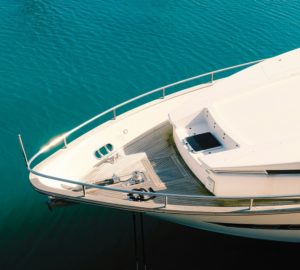
Chartering Requirements and Regulations: A Guide for Boat Owners

What are the Fastest Cruising Catamaran on the Market?
Yacht Crew Job Board
With Bluewater's expertise in crew training and yacht crew recruitment, finding your ideal yacht crew vacancy is simple. We offer yacht management services to a variety of exclusive superyachts. Our team excels in sourcing top-notch yacht crew positions, spanning from 25-meter private yachts in the Bahamas to 50-metre charter yachts in the Mediterranean to luxurious 100+ metre superyachts navigating the globe extensively.
58 yacht crew jobs available now.
Yacht Crew Training
Alongside sourcing the latest yacht crew jobs worldwide, Bluewater offers a range of specialised yacht crew training courses. Whether you're new to the superyacht industry seeking entry-level qualifications, an experienced deckhand or engineer aiming to advance your career, or a dedicated crew member looking to enhance your resume with certifications like HELM (Human Element Leadership and Management), Yachtmaster, or OOW (Officer of the Watch), explore our comprehensive yacht crew training options.
Working on a Luxury Yacht
Working as a crew member on a superyacht is undeniably one of the most rewarding yet demanding professions, calling for hard work, dedication, and professional training. The opportunities within the yachting industry are vast, and at Bluewater, we are committed to helping every crew member discover their ideal yacht crew position. Our recruitment division focuses on finding the perfect yacht for crew members and provides unparalleled professional support. Our recruitment experts guide crew members through every step of their yachting career journey, ensuring they receive the best possible assistance.
Manage Your Yacht Career
Whether you're seeking a yacht crew position as a deckhand, engineer, onboard masseuse, stewardess, chef, chief stewardess, purser, first officer, or captain, take control of your yacht career. Create a profile and join one of the world's largest yachting communities for free.
58 JOBS FOUND

- Qualifications: STCW, ENG1, PBL2
- Experience: 1 Season +
- Salary: 2500EUR (DOE)
- Qualifications: STCW, PDSD, ENG1, Food and Hygiene Level 2
- Salary: DOE
- Permanent - Rotational
- Qualifications: STCW, ENG1, FHL2
- Experience: -
- Salary: €7000 + (doe)
- Qualifications: Master 3000
- Experience: 10 years +
- Salary: Attractive salary (doe)
- Qualifications: STCW, ENG1, Food & Hygiene Level 2, Culinary Trained
- Salary: 3500EUR (DOE)
- Qualifications: STCW, ENG1, PDSD, PBL2
- Experience: 1 Year +
- Salary: 3000EUR
- Qualifications: Yachmaster Offshore or Deck Rating
- Qualifications: Y2
- Experience: 3 Years +
- Salary: 6000 to 6500EUR (DOE)
- Rotation 3:1
- Qualifications: STCW, ENG1, Food & Hygiene Level 2, Crowd Management Training, Crisis Management Training, PDSD, Hairdressing Qualifications
- Experience: 1 Year
- Salary: 3000EUR (DOE)
- Rotation (8:8 Weeks)
- Qualifications: ETO CoC preferred
- Experience: 2 years +
- Salary: 8000EUR
620 Crew online in last 24 hours
365 boats online in last 24 hours, find a crew™ – the world's largest online boat & crew network.

Find a Crew™ – the World's only Crew network that matches members automatically
Find a Crew™ is a global online network portal connecting Boats & Crew directly. Connect directly with members in over 200 countries from anywhere at anytime.
View, register, list, search, filter, match, & wave – all 100% free for as long as you like. All Free members can chat with Premium members who contact or reply to them.
No contracts! No commissions! No placement fees! No recurring charges! Premium members decide who can chat (personal messages) with them.
The QuickFind™ saves you hours of searching by calculating the best matches for you. Change your matching options and check your QuickFind™ to find your updated matches.
Our global success is built on by providing a secure & trusted platform. Several visibility options to manage your privacy and who can see your profile.
and best of all
Find a crew™ does not have ads, and we don't sell personal information to anyone.
We don't link or post profiles to social media, we don't submit profiles to search engines, and we don't publish or sell statistical user information.

How Find a Crew™ works for Free members
1 create your profile.
free to register, list, match, search & wave try us for as long as you like as a Free member
2 Instantly see your matches
find your best matches with a ‘QuickFind’ click use 'Follow' to manage your favourites
3 Connect quickly, and safely
check mutual interest first with a wave send chat replies to Premium members
How Find a Crew™ works for Premium members
$ upgrade anytime when you're ready.
upgrade anytime, anywhere, anyone to Premium, either as a Boat or a Crew member with a Premium duration that suits you from one month to up to 5 years and chat (exchange personal messages) with any matching members Premium can be paused for up to 18 months Premium never renews automatically

Five good reasons to use the global Find a Crew™ network portal
Let the world come to you, wherever you are – with a single click. At Find a Crew™, you have thousands of locations, marinas and docks in over 200 countries and 5 oceans at your fingertips.
Anyone and everyone has the freedom to make their own choices to experience what they want. We aim to be here for anyone, anytime, anywhere – without trying to be everything to everyone.
Only members who have signed in within the last 45 days are listed – 100% guaranteed. This makes it much more likely that you will find and connect with someone who is here to find you too.
The Find a Crew™ network is fully monitored and all profiles are checked daily for suspicious activity. We work hard to host a safe and secure website – for your peace of mind.
Protecting your identity and privacy is our mission. We care that no one can access your contact details without your permission. It's a smart choice when connecting with strangers.

Find a Crew™ is proudly featured by


How to become Yacht Crew ?
How to become a deckhand a stewardess on superyachts, can a yachting career really be true .
Yes. The industry employs 50 000 crew worldwide. For entry level positions no education is required apart from being at least 16 years old, healthy and willing to work hard.
Is Yachtiecareers free ?
Yes, Yachtiecareers also does yacht recruitment, focusing only on junior deckhand and stewardess positions. We are the only agency in the world to offer this service for free for both crew and Superyachts.
We choose Superyachts carefully, that we know will be a good match for you starting.
How much do i need to pay ?
We can kick-start your career, giving you a basic package for only €12, this is giving you an Introduction, E-book and a 100€ award to spend on kick-starting your career, without making a big commitment. To see if it is right for you.
Are these courses for me ?
These courses has been specifically developed by experienced leaders in the Super Yacht industry for you with no prior experience.
The courses gives you the skills and full service with a personal instructor giving you all you need so that we can employ you on board.
Whether you are just starting or looking for your first job. Yachtiecareers is the best place to start.
What is required ?
The only pre-requirement is that you are minimum 16 years old.
Before starting your first job you need to complete a safety course and get a medical certificate. We guide you through the whole process.
What is the Deckhand Job ?
Deckhand is one of the entry level positions you can select. You will work closely in a professional team operating tenders, jet skis and water sports. Being in charge of washing and detailing the exterior parts of the Yacht.
What is the Stewardess job ?
Stewardess is one of the entry level positions you can select. You will work closely in a professional team in charge of the interior providing luxury service to the Owners and VIP guests.
What is my yachting salary ?
Starting salary for entry level positions start from € 2500-3500 per month. Developing your career salaries are over 10 000 euros per month. Yachts also offer very lucrative bonuses, tips and holiday packages.
How do I start working on Superyachts ?
We recommend getting a certified Instructor and Yachtie Careers training and tools to start. This is a proven way that works.
Before starting to look for work, you need the Yachtie Pro course, this will make you ready to work on board and give you the right skills and training.
Once you have this you will together with your personal instructor design your route. We recommend starting in Antibes or Palma.
Why choose YachiteCareers ?
- We are working in leadership postions on Superyachts.
- We have been in the same situation you were in starting, not having the right guidance
- We have made a package and training , making it easy,fun and a succesful adventure starting and getting a yacht job fast.
What if it does not work ?
After recruiting for junior positions for 10 years, we have designed a step-by-step plan that works. We guarantee that if you follow this plan with your personal instructor, you will be successful.
Or we give you your money back.
Are the yacht courses quality good ?
The first edition was over 5 days of material. But we made it into 5 modules covering what really matters, and what is giving you the job. The rest you can access in our guides and be guided by our experienced crew members.
What is in the yacht training ?
We give you the tools and engaging training to start. Once completed you will be matched with a personal instructor to make sure you follow or plan that you can ask.
We take care of everything from Visas, to CV writing to job interviews, getting a bank account and signing your first contract.
Is Yachting right for me ?
In my experience, everyone I have met, has always been able to offer something of value to us on board. If you like new exciting experiences, travel, meeting friends and grow as a person, it is the right choice for you.
What Certificates do I need to start?
The minimum certification you need to start is Basic Safety STCW, Medical Certificate and Passport. Yachtiecareers gets you all this but so much more. We give you the training to succeed.
We have a 10-step plan for this, that you will do with your Stewardess instructor. It takes work and effort, but we make it fun and an enjoyable learning experience.
We have a 10-step plan for this, that you will do with your Deck instructor. It takes work and effort, but we make it fun and an enjoyable learning experience
Yes! Please check our job board, for open positions. To maximise your chances, make sure you have our CV, references and training to start.
You will have a personal instructor, and all the right tools and guidance.
With us failure is not a possibility.
We have included a full training and service package that you need to a good price, saving you money and time.
They will all be a part of your training and completing it. You will learn from each one.
But after the training, we match you with one that suits your location, yacht type and wishes best.
This is where we give you both trainings, but also all the international certifications you must carry on board. You will have a full training week with hotels on the beach in beautiful Croatia, Spain or France, learning , making friends and starting your career in the only and best way possible.
The best options for starting in the industry.
Most of the crew are clueless of what we require on board, and the once that get on board are not ready for the tasks ahead. Our training solves both these problems.
There are to much old fashioned agencies, irrelevant courses and hate on facebook groups giving the wrong advice, with high fees and low level of knowledge.
This is so you do not have to go through the long periods of mistakes, self doubt and struggles we had to go through starting. We guide you all the way.
STCW Yacht Deckhand Training Europe
All stcw certificates and yacht training to get a yacht job as a deckhand (split, croatia).

STCW Yacht Stewardess Training Europe
All stcw certificates and yacht training to get a yacht job as a stewardess (split, croatia).

Do you need help to become a Yacht Stewardess or a Yacht Deckhand ?
Become yacht crew by getting the right qualifications and certificates, how to start working on yachts .
Simply select your location and position above and get full access to Yachtiecareers Training programme. This gives you all mandatory STCW Basic Safety Certification with a training week in US or Europe.
How to Get into the Yachting Industry ?
Once you have the basic qualifications (STCW) you can register and apply through any of the reputable recruitment agencies – such as Nordic Yacht Support , Yachtiecareers or Yacrew.com. Another way is to “dock walk” looking for daywork. This involves quite literally walking the docksides where superyachts are berthed – such as Antibes, St Tropez, Palma and other Mediterranean ports, looking for daywork or temporary positions.
How Long Will it Take to Get a Yacht Job ?
The Superyacht industry is volatile, things can happen very quickly. You are dock walking and meet a Captain who, because a crew member has left and the yacht is sailing imminently, is looking for a dayworker/deckhand to start immediately, so be prepared to drop everything to come aboard.
On the other hand a Captain could be looking to recruit crew looking for long term employment (referred to in the industry as “longevity”). The Captain could be looking to build a particular type of person who will be able to work with other crew members as a team. It also depends on the time of year you apply.
What are the basic Entry Qualifications to become yacht crew ?
For employment on a commercially registered superyacht, the minimum requirement for all crew is basic safety training. STCW The basic safety training is known as Standards of Training, Certification and Watch keeping for Seafarers (STCW). This safety training was developed by the International Maritime Organisation (IMO). The full course comprises four modules/certificates:
- Personal Survival Techniques
- Fire Fighting and Fire Prevention
- Elementary First Aid
- Personal Safety and Social Responsibility
This is the STCW minimum qualifications to work on ships and on commercial yachts. When you book our Deckhand and Stewardess packages you also get an included STCW Basic Safety Training week in Croatia or Florida to get your full STCW certification and Basic Safety training.
Our packages above include every STCW certificate, Yacht CV and yacht qualifications you need to become a stewardess or deckhand to work as yacht crew on board.
Do you need help to star ? If you drop us a message and a Yachtiecareers Instructor will help you out !
We are usually very quick to respond!
Or get in touch where we usually hang out:
July Training Fully Booked – 2 last spots for August with code yachtie50
Get free yacht cv and yacht job offers

Career Advice:
Email address:
Remember me Forgotten password?
Password Reset
Enter your email address and we will email you a password reset link.
Email address:
LISTEN TO THE PODCAST
Free masterclass, yachting courses, watch my free live masterclass "how to get a job on a yacht" .

back to blog
7 Ways To Nail Your First 7 Days As A Yacht Stew.
Freebie alert: Junior Stews Download now
![[PenelopeTemplate]taylor-simpson-azI_KfAnC8E-unsplash martini mondays public relations and strategy brisbane](https://static.showit.co/400/-j3kPzfNRjm8JSippHi7Dw/shared/penelopetemplate_taylor-simpson-azi_kfanc8e-unsplash.jpg)
Blog Categories
Superyacht jobs, life onboard, about yachting, listen now.
Hear about the real yacht life, info on how to kickstart your superyacht career and tips on becoming a super stew.
The Seaworthy Stew: Podcast
![[PenelopeTemplate]content-pixie-VIh-B-bNZMc-unsplash martini mondays public relations and strategy brisbane](https://static.showit.co/400/sgOjawVZS0WmIQiKY2Ntrg/shared/penelopetemplate_content-pixie-vih-b-bnzmc-unsplash.jpg)
A Chief Stew with 6+ years experience in the superyacht industry. I help aspiring crew confidently land their first job and teach the skills needed to be a stand out YACHT STEW.
Hey, I'm Jess

5 Things you need to know before you join Yachting
About yachting, filed under:.

Tune in via
Listen now- check out the seaworthy stew podcast here.
#1: It is like NO other industry
- In what other jobs would you get to experience a completely different lifestyle hands-on, and get to mix with celebrities? Okay, you’re not living the life of the wealthy guests, but you are able to experience the lifestyle, and depending on the owner, you will often have access to the equipment and luxury facilities onboard for your own use when there are no guests. Hello jet skiing in south of France!
- Expense free living – Let me explain uniform, medical, toiletries, accommodation, insurance, visas, food and drinks. It depends on the boat you are on however most of the time this is just some of the added bonus’s of working onboard
- Captain is king and whatever he says goes, if he says he would like his cabin cleaned daily the interior team does it, if it’s no drinking whilst you are on the boat you do it, if it’s a you must be back on the boat by 9pm you most certainly are home by 9pm.
- It is a somewhat superficial industry in the sense that you generally cannot be heavily overweight, some yachts are strict on who they employ. There is one particular yacht which has a reputation for employing stewardesses under 60kg, a certain height, have blonde hair and cannot speak Russian. This isn’t to say you have to be extremely slim to work onboard, you just have to be a healthy weight as the job is physically demanding and you must be fit for sea. Crew members are generally an extension of the yacht they work on. As you can imagine yacht owners want to be well represented with well dressed staff who look smart and respectful. Sailing yachts can be more casual with some known not be as strict as motor yachts.
Check out “A Day In The Life Of A Yacht Stew ” for more insights
Key Point #2: You must be fit for sea!
- You are required to have a current certificate called a ENG1 which is a medical fitness certificate before you step foot onboard. This can be obtained from your country of residence. This is just a medical exam to test your reflexes, balance, eyesight, hearing, urine and a few other general health tests.
- There are random alcohol and drug tests onboard. This is to ensure all crew members are fit for sea and can perform. It is well known in the industry which boats are renowned for drug and alcohol tests. Know your limits…. I was joining a new boat with another new stewardess a few years ago and she refused to take a drug test as I later found out she went a little to hard at her going away party a day before she left her home country… safe to stay she was quickly escorted off the boat with flights booked back to New Zealand within 24 hours. Captains can get heavily fined and lose their license for drugs onboard, so it is important crew understand the implications.
- Smoking – must include on your CV, most boats employ non-smoking staff. There is very limited boats which allow you to smoke onboard.
Key Point #3: You work whenever work needs to be done
- You work whenever work needs to be done, both without guests and when guests are on board.
- This could mean 7 hour days or 20 hour days if need be. But not to worry guests aren’t on board all the time and whilst each yacht differs most have a standard 8 – 5 working day Monday to Friday without guests on. Yes you do get weekends, long weekends and time off. You will be able to experience where you are sometimes (tropical paradise yes) but not always, the industry can be very demanding and will push your limits immensely. However it has truly made me a more stronger physically, emotionally and mentally. Working for sometimes 3.5 months everyday at a time during the season pushes you, however it is nothing you can’t handle! However it’s important for me to note that you should not attempt yachting if you can’t take orders with a smile despite how ridiculous they are. Day in Day out you need to be professional and when the time comes and you are entitled to time off you forget about the working part and become truly grateful for the incredible opportunities you are presented with.
Key Point #4: There is no guarantee you will get a job on a yacht after you complete your courses
- You need to do the hard yards first, this means getting into the yachting hubs and networking. This can be in the form of dock walking handing out your cv, meeting professionals in the industry and going to meet the yacht crew agencies face to face to show them you are committed, polished and professional.
- The industry is competitive and you need to be consistent in showing up because you never know who is hiring!
- You need perseverance and patience as it can often be weeks or months of living in the yachting hubs before you secure a job. This is why it is easier if you have some savings to support yourself while you are working towards getting a job onboard.
Key Point #5: It can change your life
- You experience some of the most incredible places people only dream of, you’re literally anchored a stones throw away from the most sought after travel destinations in the world. Don’t get me wrong you don’t get to experience all places you go but the ones you do get to make up for it! I remember being anchored in the Maldives with no guests on being able to snorkel everyday after work, watch the sunset over the water with some of my crew members who are now some of my closest friends and it was a pinch me moment. I literally am being paid to be here.
- You have the ability to save a LOT of money and still enjoy your time whether it’s dinners with the crew in Monaco, skiing in the French alps on weekends off or taking a trip to Colombia from the Caribbean. You can save with the benefit of an expense free life!
So overall there is the added bonus of being able to meet friends from all over the world. South Africans, English, Americans, Aussies and Kiwis make up most of the industry! However there’s plenty of other nationalities. You will quickly notice your relationships wether they are friendly or partners are fast paced… you live, work and play with these people every day. You discover more about a person in a smaller time… like speed-dating. And now you have friends for life all around the world to visit.

listen to the podcast
About .
I’m a chief stewardess with over 6 years experience working in the superyacht industry on boats up to 88m. I help aspiring yacht crew by propelling them with the know-how and tools to confidently break into the superyacht industry.
Hey, I'm Jess a friendly Yacht Stew here to help!

@THESEAWORTHYSTEW

privacy & terms
© 2020 the seaworthy stew, masterclass, listen on the podcast.

welcome, friend

Do You Need A Crew For Yachts? Helpful Tips (With 6 Examples)
Whether or not you need a crew for a yacht depends on several factors.
In this article, we will help you figure out exactly what you need.
Table of Contents
Here’s When You Need a Yacht Crew:
With the appropriate boat licenses, you can typically operate a boat up to 75 feet without a crew. However, most yachts need crew for docking, launching, caring for guests, and watching for danger or other boats. Without a crew, an autopilot feature may be crucial to help with keeping you on course.
A crew can help because someone must always be on watch to look for nearby vessels or other dangerous situations, as well as docking
Here’s everything you need to know about when you will need a yacht crew:
What Exactly do you Need a Yacht Crew for?

Yacht crews do a lot of things to help maintain the boat and keep it running smoothly.
Some of these duties include:
- Launching and docking the boat
- Accounting or managing the operating expenses
- Cooking, bartending, or other types of services for guests
- Engineering and/or regular maintenance for onboard appliances and ship mechanics
- Piloting and driving the boat
- Cleaning the interior and general housekeeping duties
- Supervising guests and other crew members on board
Here’s a list we made with 10 typical tasks performed by the crew on a yacht . It’s a great read if you are considering whether you will need a crew or not!
Depending on your boat and your experience, you might not need all of those duties to be done. For example, superyachts might need a cook, while sportfishing yachts might not (even if they have a grill).
Some boaters prefer to do the piloting and engineering independently, while others want to lounge around and enjoy the weather.
Make sure you analyze your reasoning for having a boat before you hire people you might not need to employ.
Do you consider boating to be a social activity? Or do you prefer to boat alone, where you can enjoy the peace that can only be found on the water?
If you’re in the latter group, you may have pondered over one or more of these questions before:
- Can I pilot this boat on my own?
- Do I need a crew?
- Why do I need a crew?

What is the Biggest Boat I can get Without Having to Hire a Professional Crew?
It really does depend on your experience with a recreational boat and how comfortable you are on your boat.
For avid and experienced boaters, anywhere from a 30’ to a 74’ sportfishing boat is a decent size that they can handle independently.
There are many things to consider when figuring out what boat to buy , especially if you plan on operating the watercraft on your own.
Remember that you’ll probably need help (even if it’s just your family and/or friends) who can help you cast off the lines and tie up when you need to dock.
Also, keep in mind that you’ll need an autopilot if you plan on using a powerboat on your own. Here’s everything you need to know about which yachts have autopilots.
Yes, many people can handle these tasks on their own, but they also have the help of electronic charting and steering, pod drives, and bow thrusters, which can help hold the boat’s position while you casually tie off.
Which Licenses Do I Need to Operate a Yacht Without a Crew?
There are several different licenses you need to know about when we are talking yachts.
Especially if you are bringing guests (if they are paying for the trip).
For more information, here is everything you need to know about boat license types .
Does Every Motor Yacht Need to Have a Crew?
When it comes to boating, there are many different types of people drawn to this recreational activity.
Some want to race, others fish, while others want to cruise around the harbor while catching some rays. In addition to that, some want to spend that time with friends and family, while some want to enjoy some peace while out on the water.
There is nothing wrong with being a “do-it-yourself” type of boater, whether you’re into sailing yachts or motor yachts. However, there are plenty of reasons why boating with a crew can come in handy.
Safety & Emergency Help:
Having a crew is safer.
It is always safer to go out on the water with other people. In emergencies, when something unexpected happens, or even if you need a hand with something, it is safer to have other passengers and crew members there for you to count on.
When you are out on the water with a limited crew or yourself, you have to be extra careful since there isn’t anyone there who can rescue you or help you get out of a tough situation.
Wearing a life jacket regularly all by yourself can get cumbersome, after all.
Because of that, short-handed boatmen often use the “Lifesling,” which is a horseshoe-shaped collar secured to a victim to help get them back on board.
Some offshore sailors tow a long line behind the vessel for a crewmember to grab if they fall overboard.
Guests & Cleanup Help:
If your yacht is commercial or hosts guests, operating it is like owning a small hotel.
Crews are a must when you have guests onboard, as you will not be able to pilot the yacht, dock, launch, clean, cook, serve, and entertain guests.
Furthermore, you shouldn’t have to!
Guest experiences are made better when you have all hands on deck to help keep things running smoothly and safely. Taking on that burden alone is not necessary.
Family Yacht or Single Captain:
Some families like to own their own yacht and don’t care about crews or getting help out on the water.
Families of four or five could potentially crew the yacht themselves!
Therefore, if your ship is for personal and private use and you don’t want to hire a crew, make sure you bring enough people with you to help you take care of the ship’s requirements.
If you are a single sailor, however, and you captain, dock, launch, and maintain the ship yourself, make sure that you have open radio communications if you ever need help and have to call the coast guard.
What Do I Need to Own and Sail a Yacht?
If you choose to set sail on your own, it is important to have the right disaster and spare equipment on board in case of emergency.
A common checklist of everything you need to do, from trailering to getting underway to cleaning the boat, can be handy in emergencies.
After all, it can be difficult to think of what to do when your adrenaline is through the roof.
Let’s go over some basic emergency equipment for your boat as well as some handy spare parts you should keep close at hand:
- PFD’s, horn, fire extinguisher, and other appropriate safety equipment
- Floatation devices and emergency raft
- VHF radio, a cell phone, or a satellite phone
- A pair of binoculars
- Maps and charts
- Two to four fenders
- Some extra dock and anchor lines
- An extra plug for your hull drain
- An extra set of keys
- A spare bearing set and tire for your trailer
- Some engine oil (just in case)
- A basic tool kit (look and make sure that the tools match the hardware on your boat)
- A couple of flashlights
- Duct tape (which will always come in handy)
- Brush for your boat
- A trailer coupler lock
- Your boat cover
- Some sunscreen and a hat (and other skin protection)
- Spare alternator belt
- Spark plugs
- An extra set of bearing and hubs
- Extra prop and hardware
- Another water pump kit
- Spare flags for emergencies
What Training do Crewmembers need to Operate a Big Yacht?

If you decide to get a crew, each member of your crew must have different qualifications, based on their role on the boat.
For professional crew members, two of the bigger training certificates are:
- STCW Basic Safety Training – This should be required of your entire crew to work on a charter yacht or a commercial yacht. It is not required for private boats, but it is highly desirable and wouldn’t hurt to have on hand.
- ENG1 Seafarer Medical Certificate – This is a medical examination required to prove whether or not you are fit for working on the water. An MCA-approved doctor must issue this.
Each Crewmember Must Have the Following (by job description):
- MCA Efficient Deckhand training (EDH)
- Deck/Yacht training
- VHF radio training
- RYA Radar training and the RYA competent crew training
- MCA Proficiency in designated security duties (PDSD)
- RYA Powerboat (at least level 2) and the RYA Tender Operator
- General GRP and carpentry repairs
- An interior crew-training course or courses, such as the PYA GUEST Program
- STCW Proficiency (Medical First Aid) and the STCW Proficiency in Survival Craft and Rescue Boats
- VHF Radio Short Range Certificate (GMDSS/DSC)
- RYA Powerboat (at least level 2)
- PWC Personal Watercraft Proficiency
- MCA Proficiency in Designated Security Duties (PDSD) and the MCA Human Element, Leadership and Management (HELM) at Operational Level
- Deck / Yacht Rating
- AEC Approved Engine Course
- MEOL Marine Engine Operator License
- Marine Diesel Training and Experience
- Auxiliary Equipment & Basic Ship Construction
- MCA Sea Survival for Yachtsman
- Advanced Fire Fighting
- STCW Proficiency in Medical First Aid
- Chief Engineer Statutory & Operational Requirement
- Applied Marine Engineering
Final Thoughts:
Having a crew aboard your vessel will help you ensure that you have a fun, leisurely cruise or voyage.
An experienced crew can help ease your tensions and worries. A crew can help alleviate the chaos and energy that might come with frantically doing things on your own.
There are many yachts out on the water, which is operated “short-handed.”
This means that it is being operated on less than the usual number of crew members that would typically be used.
In the past, it was common practice that 70-foot boats had dedicated captains and crew members (at least one). These days, 80-foot boats are being crewed by husband-wife teams.
If you choose to go this route, make sure to:
- Choose the right yacht for you (the right size and type)
- Outfit the yacht for extra amenities, balanced with simplicity (don’t make things overcomplicated)
- Prep yourselves by talking through scenarios beforehand, planning, and taking your time.
- Consider anchoring via remote controller for the power windlass.
- Have the appropriate emergency gear on board.
Being a short-handed boater can seem intimidating, but it can be a wonderful adventure as well.
Click to share...

How to Become a Superyacht Steward(ess)
All you need to know about starting a career a steward(ess) on a yacht
Steps to Get a Job as a Yacht Steward/Stewardess:
- Understand the role of a Steward/Stewardess onboard a yacht
- Complete Steward/Stewardess training courses
- Obtain an ENG1 or ENG1 Equivalent Medical Certificate
- Select the correct time to travel and look for work
- Obtain visas & documentation
- Create a superyacht CV
- Apply for jobs
- Gain additional/transferable skills
- Keep up to date with the latest Steward/Stewardess jobs
- Mentally prepare yourself

1.Understand the Role & Duties of a Yacht Steward/Stewardess
The structure of the interior department varies depending on the size of the yacht. The duties of a steward or stewardess change accordingly.
Small yachts require diverse interior staff who can help with service, laundry, food preparations and at times help on with deck operations. Large yachts have a more segmented approach with roles focused on specific areas of service or housekeeping.
It is advisable to understand what the position entails so that you have realistic expectations of the job at hand.
2.Yacht Steward/Stewardess Training Courses
All superyacht crew need to hold both mandatory and department specific qualifications. All interior crew need to hold an STCW Basic Training Certification , including Proficiency in Security Awareness or Proficiency in Designated Security Duties , a Food and Hygiene Level 2 Certificate as well as other courses depending on your desired role and vessel type.
Although training courses are not cheap, it is important to invest in yourself and your employability. At the end of the day, it comes down to your budget and career goals.
Find Out More About Steward / Stewardess Training Courses
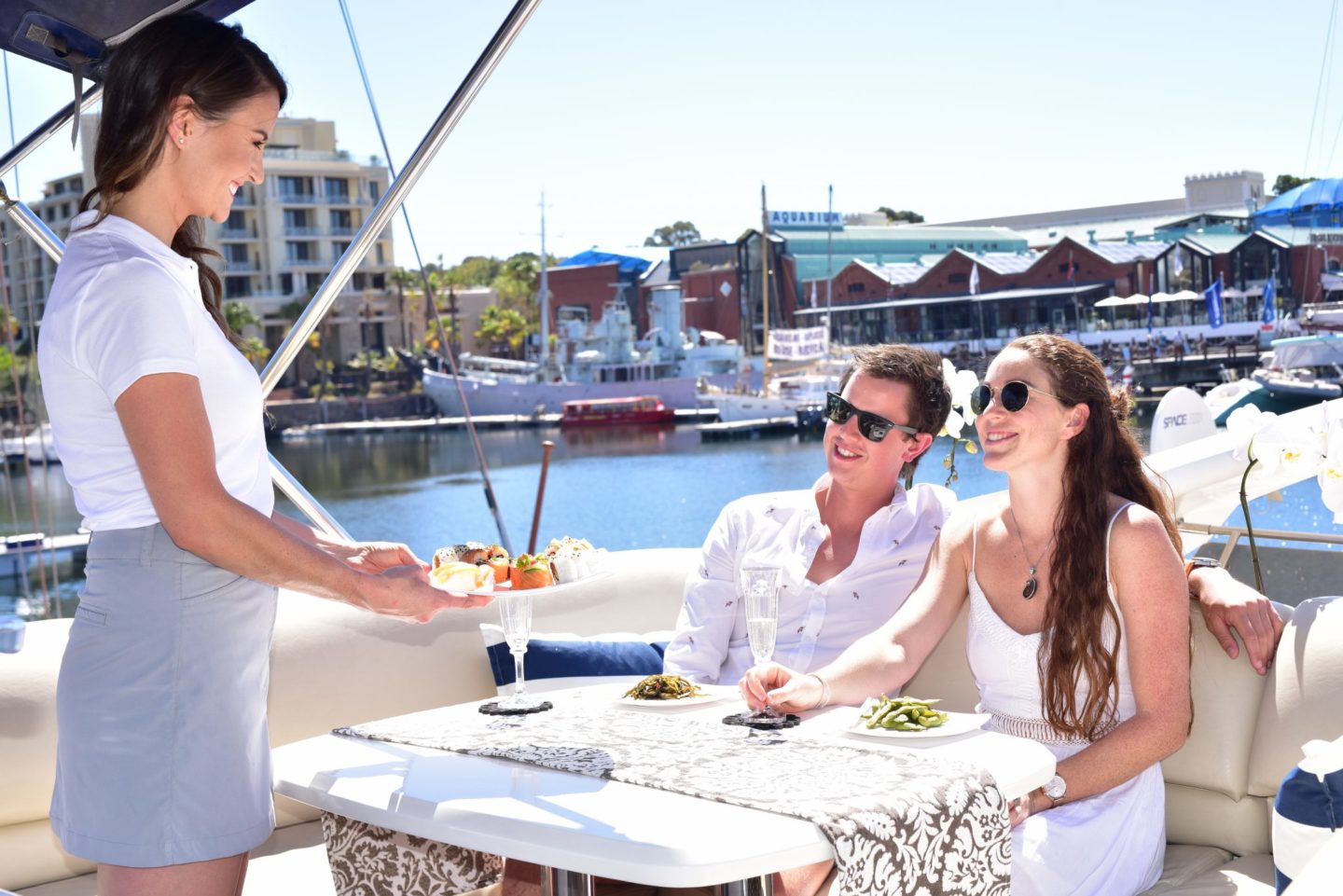
3.Complete The Essential Requirements For All Crew
Now that you have a good understanding of what being a stewardess is about and you have completed the necessary training, it is time to take action. All crew need to hold an ENG1 medical certificate which will certify you as fit to work at sea. Visas are required in order to travel to super yachting locations to attend interviews. You need to register with crew agents and ensure that you are applying for jobs wherever possible. Building a positive reputation together with a strong network of individuals involved in the industry is key.
Complete The Steps To Start Working On A Superyacht.
4. Gain Additional Steward/Stewardess Skills:
In addition to the above mentioned steps, there are many other transferrable skills that will benefit your chances of being employed as a successful stew. These include, but are not limited to the following:
- Table Service or Silver Service
- Bartending/Cocktail Mixing
- Flower Arranging
- Table Setting
- Boat Driving Experience
- Childcare & Teaching

5. Apply For Steward/Stewardess Jobs
In order to find the right job as a Steward/Stewardess, it is essential to stay up to date with the latest yacht and superyacht positions.
You can do this on My Crew Kit's easy to use job aggregator board! Make sure to sign up so that you can save all of the jobs you are interested in, in your account.
View Available Stewardess Jobs
Yacht Steward/Stewardess Career Assistance
In order to become a successful yacht steward or stewardess you should be an energetic, enthusiastic and presentable individual who possesses a strong work ethic with a passion for hospitality.
Becoming a stew onboard the superyachts is not for the faint hearted as the job requires a lot of hard work. With hard work comes great benefits such as travelling the world, days off in spectacular destinations, a thriving social life, great holidays and good pay.
If you have any questions, it is best to speak to a superyacht Steward/Stewardess training expert.
Get In Touch With An Expert
Username or Email Address *
Remember me Lost your password?
Username or Email
Get New Password

What Size Yacht Requires a Crew? Here’s What You Need to Know

Do you dream of owning your own luxury yacht? Are you wondering what size yacht requires a crew and what kinds of responsibilities the crew members have? Whether you are just beginning to plan your yacht purchase or are a seasoned boat owner, this article will provide you with valuable information about the types of crew members, their responsibilities, and the benefits of having a crew on a yacht.
You will also learn how to choose the right crew for your yacht, considerations for hiring a crew, and how to properly care for your yacht crew .
So, let’s dive in and explore the exciting world of yachting!.
Table of Contents
Short Answer
Yachts that are over 30 feet in length generally require a crew to operate them safely.
This is because larger yachts typically require more maintenance and management than smaller ones, and without a trained crew, they can be difficult and dangerous to operate.
Some yacht owners opt to employ a full-time crew, while others may hire part-time or seasonal help depending on their needs.
What is the Definition of a Yacht?
When it comes to understanding what size yacht requires a crew, its important to first define what a yacht is.
A yacht is a large, luxurious vessel that is typically used for pleasure trips.
Yachts are typically motorized, and can vary greatly in size and design.
They may be used for leisurely cruises, racing, or any other type of recreational activity.
Yachts can range from small, open-deck vessels to large, multi-deck superyachts.
Generally, yachts over 80 feet in length are considered to be large enough to require a crew for operation.
The size of yacht that requires a crew depends on the size of the vessel, its intended purpose, and the needs of the owner.
Large yachts may require a larger crew to operate and manage the vessel, while smaller yachts may only need one or two crewmembers.
The crew will typically consist of a captain, engineer, mate, deckhand, steward or stewardess, and chef.
The captain is responsible for the navigation and operation of the yacht, as well as overseeing the other crewmembers.
The engineer is responsible for the maintenance and repair of the yacht.
The mate is responsible for deckhand duties such as cleaning and painting.
The deckhand is responsible for assisting the mate with various tasks.
The steward or stewardess is responsible for housekeeping and other guest services.
The chef is responsible for preparing meals for the guests.
Overall, the crewmembers are responsible for the day-to-day operation of the yacht, including navigation, maintenance, and housekeeping.
They are also responsible for providing a safe and enjoyable experience for the yacht’s guests.
Depending on the size of the yacht, the crew may also be responsible for additional tasks such as security, entertainment, and other services.
What Size Yacht Requires a Crew?

When it comes to yachts, size definitely matters.
If you want to enjoy the luxury of sailing the open seas, you’ll need to consider if a crew is necessary.
Generally speaking, yachts over 80 feet in length require a crew to operate.
Larger yachts may require a larger crew depending on the needs of the owner.
When it comes to crewmembers, they can include a captain, engineer, mate, deckhand, steward or stewardess, and chef.
These crewmembers are responsible for the day-to-day operation of the yacht, including navigation, maintenance, and housekeeping.
Additionally, they are responsible for providing a safe and enjoyable experience for the yacht’s guests.
The captain is typically the most experienced member of the crew and is in charge of all operations on the yacht.
The engineer is responsible for the maintenance and repair of the yachts mechanical systems.
The mate is responsible for navigation and safety, as well as assisting the captain with tasks.
The deckhand is responsible for taking care of the exterior of the yacht, such as cleaning, painting, and polishing.
The steward or stewardess is responsible for providing hospitality services to the guests, such as serving food and drinks.
Lastly, the chef is responsible for preparing meals for the guests.
Having a crew onboard a yacht is beneficial for many reasons.
A crew ensures that the yacht is operated safely, efficiently, and with the utmost care.
They also provide a level of luxury and convenience that many yacht owners desire, such as gourmet meals, drinks, and recreational activities.
Furthermore, having a crew onboard can help to alleviate stress and anxiety, allowing the yachts owner to focus on enjoying the voyage.
In conclusion, yachts over 80 feet typically require a crew to operate.
Depending on the size and needs of the yacht, the crew can include a captain, engineer, mate, deckhand, steward or stewardess, and chef.
Having a crew onboard provides a level of luxury and convenience that many yacht owners desire.
Furthermore, a crew ensures that the yacht is operated safely and efficiently.
Types of Crew Members and Their Responsibilities
When it comes to operating a yacht over 80 feet in length, a crew is necessary.
The size and number of the crew will depend on the needs of the yachts owner, as well as the size and type of yacht.
Common crew members can include a captain, engineer, mate, deckhand, steward or stewardess, and chef.
Each crew member has a unique set of responsibilities that are essential for the successful operation of the yacht.
The captain is the leader of the crew and is responsible for the overall safety, navigation, and maintenance of the yacht.
They must have the appropriate qualifications and experience to safely navigate the vessel and its passengers.
The captain is also responsible for ensuring that the yacht complies with all applicable laws and regulations.
They are often the main point of contact between the yacht and any authorities.
The engineer is responsible for the maintenance and upkeep of the yacht.
They must be knowledgeable in all aspects of the yachts mechanical and electrical systems, including engines, generators, and other onboard systems.
They are also responsible for troubleshooting and repairing any issues that may arise.
The mate is responsible for assisting the captain with navigation, maintenance, and other duties.
They must have an understanding of the vessels systems and be able to take the helm in the captains absence.
The deckhand is responsible for maintaining the exterior of the yacht.
This includes cleaning, polishing, and waxing the hull, decks, and exterior surfaces.
They must also be knowledgeable in the use of deck equipment, such as winches, windlasses, and mooring lines.
The steward or stewardess is responsible for housekeeping duties on board the yacht.
This includes cleaning and maintaining the interior of the yacht, as well as preparing meals and drinks for the guests.
The chef is responsible for preparing meals for the guests and crew.
They must be knowledgeable in all aspects of food preparation and presentation, as well as food safety and hygiene.
These are the typical crew members of a yacht over 80 feet in length.
Each crew member is responsible for ensuring the safe operation of the yacht and providing a pleasant and enjoyable experience for the guests.
An experienced and knowledgeable crew is essential for the successful operation of any yacht.
Benefits of Having a Crew on a Yacht

Having a crew on a yacht is an invaluable asset for any yacht owner.
A crew can provide a variety of services and benefits that can greatly enhance the experience of owning a yacht.
Having a crew on board can increase the safety of the yacht and its passengers.
A crew can help to navigate the yacht through unfamiliar waters, as well as handle any emergencies that may arise.
A well-trained crew can also help to maintain the yacht, ensuring that it is running at optimal performance.
In addition to safety, a crew can also provide a more enjoyable experience for those on board.
A crew can be responsible for housekeeping and meal preparation, freeing up the owner and guests to relax and enjoy the journey.
A crew can also help to organize activities, such as fishing, waterskiing, and sightseeing, to ensure that all passengers are entertained.
Having a crew on board also allows for greater flexibility when it comes to planning a trip.
A crew can help to plan a route, as well as provide advice on the best places to visit, the best restaurants to dine at, and the best activities to enjoy.
Finally, having a crew on board allows for peace of mind when it comes to operating and maintaining the yacht.
A crew can handle repairs and maintenance, as well as provide timely advice on any issues that may arise.
Overall, having a crew on a yacht can provide a wealth of benefits that can help to make the experience of owning a yacht much more enjoyable.
From increased safety and flexibility to more enjoyable activities, a crew can help to make owning a yacht a truly remarkable experience.
How to Choose the Right Crew for Your Yacht
Choosing the right crew for your yacht is an important decision that can make or break your boating experience.
Not only do you need to consider the size of the yacht and the number of crew members required, but you also need to make sure that the crew members you select are experienced, well-trained, and knowledgeable about the type of yacht you have.
When selecting a crew for your yacht, there are a few key factors to consider.
First, you need to make sure the crew members are qualified and certified to operate the vessel.
It is important to have a captain and crew that have the necessary certifications and experience to safely operate the yacht.
Additionally, you should consider the size of the crew you need.
Depending on the size of your yacht and the activities you plan to do, you may need more or fewer crew members.
In addition to experience and qualifications, you should also consider the personalities of the crew members.
You want a crew that is professional and knowledgeable, but also friendly and accommodating.
You want to make sure that the crew you select will be able to work well with the yachts guests and make sure everyone has a safe and enjoyable experience.
Finally, you should consider the cost of the crew.
Different crew members may have different rates depending on their qualifications and experience.
You should also factor in the cost of any additional supplies or equipment needed to operate the yacht, as well as any licensing or permit fees.
With careful consideration and research, you can select a crew that is qualified, knowledgeable, and friendly, and that will ensure that everyone aboard the yacht has a safe and enjoyable experience.
Considerations for Hiring a Crew

When it comes to hiring a crew for a yacht over 80 feet in length, there are a few key considerations to keep in mind.
The first is the size of the yacht.
Depending on the size and layout of the yacht, the number of crew members required may vary.
Larger yachts typically require a larger crew to manage maintenance, navigation, and housekeeping duties.
The second is the type of crew members you need to hire.
Yachts over 80 feet will typically require a captain, mate, engineer, deckhand, steward or stewardess, and a chef.
These crew members are responsible for the day-to-day operation of the yacht, and must be experienced and knowledgeable in their respective areas.
The third is the budget.
Hiring a crew for a yacht of this size can be expensive.
Depending on the size and scope of the vessel, the cost of hiring a crew can range from tens of thousands of dollars to hundreds of thousands of dollars.
Finally, you should also factor in the experience of the crew.
It is important to hire experienced and knowledgeable crew members who are familiar with navigation, maintenance, and housekeeping.
They should also be able to provide a safe and enjoyable experience for the yacht’s guests.
By taking all of these considerations into account, you can ensure that your yacht is well staffed and that the crew is up to the task of operating and maintaining the vessel.
How to Care for Your Yacht Crew
Having a yacht crew can be a great way to make sure your yacht is running smoothly, but it also comes with certain responsibilities.
As the yacht owner, you must ensure that your crew is taken care of and their needs are met.
This means providing them with proper wages, benefits, and a safe and comfortable working environment.
The first step to taking care of your crew is to ensure they are paid a fair wage.
This should be based on the size of the yacht, the type of work they will be doing, and the amount of experience they have.
It’s important to remember that the crew is responsible for the safety and enjoyment of the yacht and its guests, so they must be adequately compensated for their work.
In addition to wages, the crew should also be provided with benefits such as health insurance and paid vacation.
This ensures they are taken care of and that they can take time off if needed.
It also shows that you value their contributions to the yacht and appreciate their hard work.
Finally, you should also provide a safe and comfortable working environment for your crew.
This means making sure the yacht is well-maintained and that all safety protocols and regulations are followed.
It also means providing adequate rest and leisure time for the crew, as well as ensuring that their living quarters are clean and comfortable.
Taking care of your yacht crew is essential for ensuring that your yacht runs smoothly and that your guests have a safe and enjoyable experience.
By providing them with a fair wage, benefits, and a safe and comfortable working environment, you can make sure your crew is taken care of and your yacht is running at its best.
Final Thoughts
As you can see, owning a yacht larger than 80 feet will require a crew to operate.
Depending on the size of your yacht, you may need to hire a captain, engineer, mate, deckhand, steward or stewardess, and chef.
When choosing your crew, it is important to consider their experience, qualifications, and availability.
Additionally, it is important to be mindful of their wellbeing and provide them with a safe and comfortable environment.
Ultimately, having a crew on your yacht can provide many benefits and provide you with a memorable and enjoyable experience.
James Frami
At the age of 15, he and four other friends from his neighborhood constructed their first boat. He has been sailing for almost 30 years and has a wealth of knowledge that he wants to share with others.
Recent Posts
When Was Banana Boat Song Released? (HISTORICAL INSIGHTS)
The "Banana Boat Song" was released in 1956 by Harry Belafonte. This calypso-style song, also known as "Day-O," became a huge hit and remains popular to this day for its catchy tune and upbeat...
How to Make Banana Boat Smoothie King? (DELICIOUS RECIPE REVEALED)
To make a Banana Boat Smoothie King smoothie at home, start by gathering the ingredients: a ripe banana, peanut butter, chocolate protein powder, almond milk, and ice. Blend the banana, a scoop of...
Essential Guides
Ocean Mapping
New to Yachting
- May 3, 2023
Yachting is a unique career that gives you the opportunity to travel the world whilst working as part of a close-knit, united crew on some of the most advanced luxury superyachts.
Discover the crew behind the ultimate yachting experience
Creating the ultimate guest experience on board a yacht takes a variety of dedicated people with different skills and backgrounds. Depending on its size and operational structure, each yacht requires a unique skill set and a different number of crew members on board.
Generally speaking, smaller superyachts between 24-30m (80-100ft) in size will require a crew of between 2 and 8 members, whereas mid-sized yachts between 30-60m (100-200ft) will require between 8 and 20 crew members. Larger superyachts that are over 60m (200ft) in size will usually have a much bigger crew of over 20 people, whereas yachts over 100m (328ft) in size will have anywhere between 30 to 50 or more members on board to operate and maintain the vessel.
Each crew needs a different range of skills and every crew member will have their own titles and responsibilities on board. The range of exciting roles available on board larger superyachts include opportunities in:
The Deck Department: Includes Officers, Bosuns and Deckhands, the Deck Department is under the command of the Captain and is responsible for both the safe navigation and operation of the yacht.
The Engineering Department: Built up of a Chief Engineer and, depending on the size of the yacht, other Engineers, ETOs and AV/IT Officers. The Engineering Department is responsible for all mechanical and electrical operations on the yacht. From maintaining the propulsion systems to plumbing and HVAC systems, they are responsible for the safety, performance and efficiency of all the mechanics and electrics on board as well as ensuring compliance with any applicable regulations.
Interior Department: The interior department is focused on attention to detail and manages everything regarding the guest experience on board. This department includes Chefs, Stews, and Pursers, as well as specialist positions such as Spa Therapists, Nurses, Personal Trainers, etc.
Bespoke training is offered to the interior team, giving them the confidence to deliver world-class service on board. Crew members joining the deck and engineering departments will need to obtain certifications allowing them to safely man the vessel throughout the journey.
Whilst working on the yacht, crew members share their work and living spaces as well as create memories from once-in-a-lifetime experiences together. We know that it’s important that personalities and characters match and crew members can work and live together in harmony, so guests and crew can have the best time on board.
Here at YPI CREW, our solutions-driven recruitment team pride themselves on their extensive knowledge of the yachting industry and are experts in superyacht recruitment . We are committed to handpicking the best-suited candidates for every yacht, building a high-performing, friendly crew able to deliver the ultimate guest experience on board.
By working with us, we can make the job search for your ideal yacht job easier by offering you direct access to exclusive job offers, personalised job search support, and professional assistance to help you create a tailored CV . Create a YPI CREW profile today and our recruiters will be able to contact you directly when a suitable position becomes available.
Most read articles

Tips & Tricks
How many crew members are needed on a yacht?

How to Find A Caribbean Yacht Job

Yacht Job Offers
Open Yacht Crew Jobs In April 2024

How to Become A Yacht Purser: Interview with Purser Trainer Angela Wallace

YACHT CREW GUIDES
IS YACHTING THE RIGHT CHOICE FOR ME?
Essential yacht guides

Mandatory certificates

What you need to know about B1/B2 visa

How to prepare for a yacht interview?
Read more latest news

YPI CREW Announces its 2024 Superyacht Recruitment Market Report

Embarking on an Engineering Career in Yachting: Crafting Your CV

YPI CREW is a proud sponsor of the ‘Seas the Day’ Ocean Rowing Team

TIPS & TRICKS

HOW TO WRITE A MEMORABLE YACHTING CV

YACHT CREW SALARY GUIDE
Error 404 — page not found, we’re sorry, we couldn’t find what you were looking for.
Please return to the YPI CREW homepage
Let’s get started. Call us on +33 (0)4 92 90 46 10 or email us.
Our mission, vision and values, mlc 2006 compliance, essential guides, yacht crew positions.
Chief Officer
Second Officer
Third Officer
Chief Engineer
Interior Crew
Head of Service
Head of Housekeeping
Specialist Positions
Spa Manager
Spa Therapist
Personal Trainer & Yoga Instructor
Hairdresser
Mandatory Certificates
B1/b2 visa information, how to write a memorable cv, how to prepare for an interview, yachting seasons, yacht crew salary guide, is yachting the right choice for me, cv templates, ocean mapping, new to yachting.
+33 (0)4 92 90 46 10
- Brokerage New Construction How to Buy How to Sell
- Yacht Fleet Yacht Catalog Charter Marketing Destination Guides
- Financial Services Payroll & Accounting Payroll Service Process Logistical Support Admin Services Crew Admin
- Job Descriptions Crew FAQ
- About Sitemap
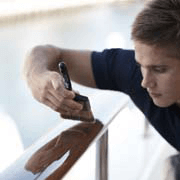
- Yacht Department Directory
- Deck Department
About the Bosun
The bosun onboard a yacht demonstrates a good understanding of exterior maintenance and repair, strong worth ethic, great attitude and sets a good example for the junior deck crew. Product knowledge for exterior maintenance and repair is crucial and it is possible the bosun will possess at least one specialized skill such as rigging or varnishing above deckhand level skills. The successful candidate will also likely have extensive water sports and guest tender driving experience. Two to three years of experience as a deckhand with the appropriate license needed for the specific vessel and program is usually necessary.
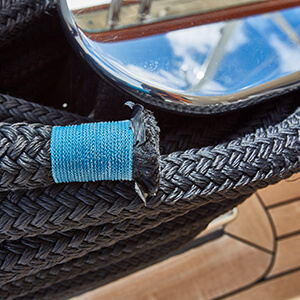
Job Responsibilities
- Cleanliness and maintenance of yacht
- Acquiring knowledge of all equipment and maintenance products on board
- Develop, execute and assist in planned maintenance and repair projects; varnishing, painting, caulking, fiberglass repair
- Guest liaison for water sports
- Continued education and licensing
Required Skills
- Experienced deckhand
- Maintenance skills; painting, varnishing, caulking, filling, basic outboard, some product knowledge
- Basic engineering knowledge
- Keen eye for detail
- Good tender driving
- Knowledge of water sports
- Good work ethic
- Positive attitude
Salary Modifiers
- Engineering experience or certificate
- Sports certification (i.e. dive certificate, kite surfing instructor)
- Lack of shipyard experience
Position Statistics
Career path, senior master, junior captain, first officer / chief mate, officer of the watch, junior deckhand.
- Share full article
Advertisement
How to Charter a Boat
If you want to sail off into the sunset, at least temporarily, you need to understand how to get aboard first.

By Lauren Sloss
This time of year, it’s an inevitable thought: Life would be that much better out on the water. Specifically, on a boat.
Even if you have neither a boat nor boating experience, it’s never been easier to make your nautical dreams come true — whether you want a day trip on your local lake or a fully staffed multiday voyage in a far-flung locale. Here are the initial questions that will help you plan an adventure on the water.
Whom are you traveling with?
Thinking about the size and dynamic of your group is an important first step, even if you are simply going on a day trip. Will children be on board? How old? What about elderly parents?
Dan Lockyer, the chief commercial officer of Dream Yacht Worldwide , strongly encourages travelers to determine group size — and, ideally, get people committed — before booking.
“The location that you want to go to, the time of year that you want to go, the type of boat that you want will entirely depend on the makeup of the group that you’re sailing with,” Mr. Lockyer said.
Do you want to captain, or do you want a captain?
Different charter companies specialize in certain locations, types of boats, itineraries and services. Some companies offer the opportunity for a “bareboat” charter, in which you rent the boat and take on the navigation and provisioning yourself, while others exclusively offer fully staffed options, including a captain and a cook.
If you want to captain the boat yourself, almost all outfits require some kind of proof of sailing or boating experience, often in line with local regulations.
Edward King, 45, an executive at a streaming company based in San Francisco, is experienced in sailing the city’s waterways. But on vacation, he said he would prefer to let a captain and crew take the lead.
Mr. King said he appreciates a captain who is familiar with both the local waters — “they’ll know how to avoid sailing into a certain sandbar,” he said, — as well as the local attractions.
In contrast, Matt Blake, 38, a software engineer based in Oakland, Calif., was eager to grow his sailing experience during a recent trip to La Paz, Mexico, with his fiancée. He hired a captain but made clear that the captain was there to help and teach.
Where do you want to go?
“Do you want something that’s more culturally oriented? Nature oriented? An adventure trip?” asked Mary Curry, the voyage product director of Adventure Life , which offers small group tours and private trips on land and on water around the world.
That answer can determine your destination. Popular cruising grounds include the Caribbean, Croatia, Alaska and French Polynesia, but the sky — or the sea — is really the limit. For help narrowing your focus, travel advisers often have relationships with charter companies or outfits around the world, and sailing publications offer recommendations.
Kyla Malkani, who has had experience with charters working as a destination wedding planner, recommends consulting the concierge of waterfront hotels, particularly for short-term or day rentals.
“A lot of times they will have either their own fleet or they will have some sort of connection at a dock,” said Ms. Malkani, 37, who is based in Washington, D.C., and is currently working as a content creator and freelance event planner.
What kind of boat?
Where you want to travel and for how long will likely determine the kinds of boats that are available to you. Crucial at this point, too, is an understanding of the boat’s layout and amenities.
“You definitely want to choose the right kind of boat,” said Ms. Malkani. “If you want more adventure, a sailboat is nice. If you’re looking for a luxury party environment, a yacht is best. And if you’re looking for something smooth, for older people or with kids, a catamaran is great.”
David Barclay is a luxury travel adviser who has also chartered boats for his own vacations.
“You want to match what the travelers want to what the boat offers,” he said.
Perhaps a group of friends might not mind a catamaran with functional but not luxurious marine bathrooms, but a multigenerational group might prefer more high-touch amenities.
When should I book?
Often, charter trips are once-in-a-lifetime experiences that require a great deal of advanced planning.
“You may have a specific place you want to go, or a specific time of year you want to travel,” said Mr. Barclay. “And some places just aren’t good at certain times of year.”
Naturally, you don’t want to be at sea in the Caribbean during hurricane season, or in the Mediterranean during winter storms. But you also might want to avoid peak cruising seasons, too.
The first three weeks of August are quite popular, said Mr. Lockyer. “If you have some flexibility and can travel in early July, you’ll get the same sort of great weather, a greater selection of boats and the anchorages won’t be as crowded.”
How much does it cost?
Charter costs are incredibly variable, dependent on all of the factors coming into play: your boat type and size, your destination, your group size, the amount of crew you’d like and the amenities on board. That said, costs could range anywhere from $2,000 for a day on a sailboat to hundreds of thousands of dollars for a multiday mega-yacht charter. Have a budget in mind when beginning your research process.
What if I didn’t plan far in advance?
While advanced planning is encouraged, and often necessary for bigger boat trips, it’s possible to book a boat last-minute.
Boatsetter , an Airbnb-like platform for boats, is a good resource for last-minute bookings, especially for day trips, and even has an Instant Book option for down-to-the-wire bookings.
“If it’s for a special event, or around major holidays, you may want to book a month or two in advance. But for general bookings, you can find options within a week or two,” said Kim Koditek, Boatsetter’s head of brand strategy and communications, of the company’s overnight offerings, which appear on their platform under the luxury yacht charters category .
Ms. Malkani has used Boatsetter for some of her charters, most of which have been booked with a specific goal in mind.
“I’m a sunset chaser,” she said. “My husband and I just really love being on the water, and we always try to squeeze in some sort of boat day activity when we’re traveling.”
For more travel advice, visit our collection of Travel 101 tips and hacks.
Come Sail Away
Love them or hate them, cruises can provide a unique perspective on travel..
Cruise Ship Surprises: Here are five unexpected features on ships , some of which you hopefully won’t discover on your own.
Icon of the Seas: Our reporter joined thousands of passengers on the inaugural sailing of Royal Caribbean’s Icon of the Seas . The most surprising thing she found? Some actual peace and quiet .
Th ree-Year Cruise, Unraveled: The Life at Sea cruise was supposed to be the ultimate bucket-list experience : 382 port calls over 1,095 days. Here’s why those who signed up are seeking fraud charges instead.
TikTok’s Favorite New ‘Reality Show’: People on social media have turned the unwitting passengers of a nine-month world cruise into “cast members” overnight.
Dipping Their Toes: Younger generations of travelers are venturing onto ships for the first time . Many are saving money.
Cult Cruisers: These devoted cruise fanatics, most of them retirees, have one main goal: to almost never touch dry land .

Choosing the perfect fit for your sail: Bareboat vs. Crewed Yacht charters
S etting sail in the open expanse of the sea might sound thrilling but challenging at the same time. Choosing the correct type of yacht for your voyage can be a dilemma, especially when there are so many types. But do they match your needs?
For this, the first step is to do your research. This will bring clarity to your decision on whether you want to set sail alone or need professional assistance. Choosing the correct type of yacht is crucial for a hassle-free sailing experience.
Yacht charters have endless types, but this article only gives you in-depth information about the broader categories of bareboat and crewed charters.
The goal is to help you make an informed decision by considering your group size, requirements, and priorities.
So let’s get started!
Types of yacht charters
Each yacht charter is tailored to meet different tastes and priorities, and choosing one can be overwhelming. Some of the most famous known types include:
Bareboat charters
Crewed charters.
- Skipper charters
- Luxury charters
- Cabin charters
This section will delve into the pros and cons of bareboat and crewed charters to help you plan the vacation you rightly deserve.
Chartering a bareboat gives you a thrilling experience of exploring the open sea. This type of yacht gives you freedom of navigation. This means you’re the captain, and you’re the crew.
However, the sailing period is pre-defined while renting a bareboat from a charter company.
Pros of bareboat charter:
- Flexibility
On a bareboat charter, you are the captain to set your itinerary. There is no need to stick to a fixed schedule, and you can make changes as you desire. This gives you the advantage of discovering more unexplored sites you can’t do on a busy cruise.
- Cost-effective experience
Bareboat charters provide financial leverage because you handle the boat yourself. So, heavy charges of the crew can be avoided easily. This cost-saving feature makes it an attractive choice for a memorable voyage across the sea.
- Customized experience
Chartering a bareboat allows you to be accessible to personalize your sailing experience. You can choose your dream destination and explore in solitude.
This provides an excellent opportunity to create precious, intimate memories with family and friends. So, your sailing experience will reflect your preferences and interests.
- Self-confidence
The independence that the bareboat charter offers comes with a bundle of self-confidence. You get an opportunity to manage life at sea on your own.
Getting out of your comfort zone of traditional traveling boosts your confidence automatically and motivates you to discover the hidden gem of places on your own.
Cons of bareboat charter
- Experience required
The independence that a bareboat charter offers seems attractive. However, it comes with a precondition. You must have prior sailing experience, and the necessary sailing skills are required for a self-sufficient adventure in the sea.
- Self-catering
Preparing meals, planning, and managing supplies can be daunting; on a bareboat charter, you are responsible for self-catering. It can be an enjoyable experience for culinary enthusiasts. However, it required precise planning and organizing to ensure self-sufficiency in the sea.
Even though an independent sail must be thrilling, nothing compares to having an assisted crew while you relax and enjoy the panoramic ocean scenes.
A crewed charter usually comes with a small crew of a skipper, a chef, and a hostess to assist you while you relax.
Pros of crewed charters
- Professional crew service
A skilled captain always makes navigation easier. By renting a crewed charter, you will gain a deeper insight into your destination through the crew’s local knowledge. Moreover, it ensures your safety and expert guidance in the sea.
This will not only make your journey smooth but memorable as well. Whether it comes to navigation or wanting a cocktail, the crew will be there to fulfill every need.
- Stress-free sail
The whole point of a vacation is to remain stress-free. While the crew handles all the operations and technicalities, you are left by yourself to enjoy. This provides an excellent opportunity to make memories with your loved ones or immerse in your surroundings without any worry.
With the crew catering to your every need, it leaves you plenty of time for exploration and relaxation.
- Customization
Crewed charters are famous for their adaptability. If you want to make any changes in your schedule, the crew is there to help you. You can plan intimate family gatherings and celebrations with your friends with the help of a limited but professional crew.
It is an attractive option because your voyage can be personalized to make it memorable. This adds a hint of exclusivity but at a reasonable price.
Cons of a crewed charter
- Costly
The exclusivity that a crewed charter offers comes with a price tag. Even though it ensures a wholesome experience with a professional crew, it can be a limiting factor for people with a budget constraint. So, careful evaluation is necessary when paying this much for an experienced crew to be on board with you.
- Limited privacy
Even though a professional crew ensures safety, their presence can be a compromise to your independence and privacy on the yacht. Your crew may influence your itinerary, and this results in less freedom than a bareboat charter.
However, these confusions can quickly be cleared out very easily. By communicating your needs effectively to your crew, they can maintain a balance between privacy and assistance.
- Itinerary limitations
The crew’s operations may impact your original plan, and these changes may not always be feasible. This can be frustrating sometimes but can be resolved by communicating with your crew.
However, the level of independence is different from a bareboat charter.
Now you can decide…
We have discussed the pros and cons of the primary two yacht categories. We now know that a bareboat charter stands out for independent sailors who seek a self-sufficient adventure. On the other hand, a crewed charter offers more relaxation as the operational and technical aspect of sailing is handled by crew members. At the same time, you relax in a hassle-free vessel.
These distinctions will help you make an informed decision while considering your budget constraints, prior sailing experience, and dream destinations.
Once you research, you can also contact yacht chartering companies for more information. Chartering companies worldwide, like 12knots.com yacht charters , offer a diverse insight into a fleet of yachts and sailing destinations.
So ditch the old travelling options, and for your next vacation, charter a yacht for a perfect getaway.

Yachting World
- Digital Edition

Watch: Luna Rossa Prada Pirelli’s America’s Cup Boat Innovations
- Toby Heppell
- July 15, 2024
Yachting World editor, Helen Fretter sits down with America's Cup designer, Thomas Tison to discuss the Luna Rossa Prada Pirelli America's Cup boat
The 37th America’s Cup in Barcelona this autumn is getting ever closer, and as the event heaves into view we are continuing our look at the AC75 s in our team-by-team design breakdown. Here America’s Cup designer Thomas Tisson and Yachting World editor, Helen Fretter discus the Luna Rossa Prada Pirelli team’s America’s Cup boat
Aerodynamics and Hull Design
The Italian team, known for its innovative designs and relentless pursuit of excellence, has unveiled a striking second-generation AC75 that pushes the boundaries of technology, but some things stay the same, such as the team’s (now) traditional sleek, mirrored silver finish, which not only enhances its aesthetic appeal but also serves an aerodynamic purpose.
The hull shape exhibits a deep, low-volume bustle, a design choice that contrasts with other teams’ approaches. This design aims to reduce drag, allowing the boat to point higher into the wind and increase overall efficiency. The low-volume bustle minimises wetted surface area, crucial for reducing drag and improving performance in various sailing conditions, particularly in the choppy waters anticipated in America’s Cup venue, Barcelona.
Article continues below…

Watch: Emirates Team New Zealand’s America’s Cup boat innovations
The 37th America’s Cup in Barcelona this autumn is getting ever closer, something marked by all teams launching the boat…

Watch: The Design Secrets of Alinghi Red Bull Racing’s America’s Cup boat
As the sailing world eagerly counts down to the 37th America’s Cup, the spotlight in recent months has been on…
Structural Innovations
A notable structural change in the Luna Rossa Prada Pirelli boat is the removal of traditional cross braces around the rudder. By eliminating these braces, the team has reduced weight and drag, enhancing the boat’s hydrodynamic efficiency. This innovation also simplifies the rudder support structure, which is critical for maintaining stability and manoeuvrability. Additionally, the rudder now features a fairing arrangement to streamline the flow of water and air around it, further reducing drag.
Weight Distribution and Foil Optimisation
Weight distribution plays a crucial role in the performance of these high-speed America’s Cup yachts. Luna Rossa Prada Pirelli has focused on moving weight forward, thereby loading the main foil more effectively. This adjustment not only enhances the boat’s stability but also improves its ability to lift and accelerate. By optimising the placement of weight, the team can achieve a balance that maximises speed and agility on the racecourse.

Crew Arrangement and Aerodynamic Gains
The layout of the crew and their operating environment has also seen significant changes. The helmsman’s position has been shifted forward, a move aimed at gaining aerodynamic advantages. This new configuration reduces wind resistance but is potential at the cost of visibility, with a possible handling penaltly during critical manoeuvres.
Luna Rossa Prada Pirelli AC 75 Conclusion
Luna Rossa Prada Pirelli’s latest AC75 is a testament to the team’s dedication to innovation and excellence in yacht design. By focusing on aerodynamic efficiency, structural integrity, weight optimisation, and technological integration, they have created a boat that stands out in the competitive field of the America’s Cup.
As the teams prepare to face off in Barcelona, it will be fascinating to see how these innovations impact their performance on the water. Keep following along as we continue to explore the cutting-edge developments in this thrilling race for nautical supremacy.
If you enjoyed this….
Yachting World is the world’s leading magazine for bluewater cruisers and offshore sailors. Every month we have inspirational adventures and practical features to help you realise your sailing dreams. Build your knowledge with a subscription delivered to your door. See our latest offers and save at least 30% off the cover price.

Missing N.L. fishing crew home after being found safe
Social sharing.
The crew of the Elite Navigator, the fishing vessel missing since Wednesday, arrived home safely on Saturday.
The seven crew members were greeted by hundreds of people celebrating their return to Valleyfield, a municipality that is part of the town of New-Wes Valley.
Some residents were waiting on the docks and its surrounding areas with signs and balloons. Others took to the water and greeted the crew in their own boats as they passed by on a Canadian coast guard in-shore rescue boat.
The crew members' safe arrival was emotional as family and friends tightly hugged the loved ones they thought they'd lost.
Captain of the Elite Navigator, Eugene Carter, said the crew is happy to be home after spending almost three days in a life-raft following a fire on the ship that escalated quickly.
"Within five minutes, we had seven men aboard a life-raft and there was fire around us everywhere," Carter said.
In the days that followed, Carter said the crew had to keep each other warm, there was limited water supply, and the raft kept drifting farther away from land. Nonetheless, they stayed in good spirits.
"We were actually sitting around joking with each other, using the microphone, interviewing each other with the flashlight trying to keep our hopes and everything up," he said.

But the most challenging part of the situation wasn't being stuck on a life-raft in the middle of the Atlantic Ocean — it was thinking about what their families were going through.
"The hardest thing about it was knowing we were alive and everyone here thinking the opposite. That was the hardest thing to cope with out there," Carter said.
Llewellyn Howell, brother of one of the crew members, said people who grew up in fishing communities were raised to expect the worst.
"The thing is, we thought there was no chance. None whatsoever," Howell told CBC News.
Even the town's mayor called the situation a miracle.
"It's nothing short of a miracle," said Michael Tiller.
'Good to be home'
The entire crew was found in a life-raft by search-and-rescue teams on Friday night.
"A hand-held red flare was spotted, which led us to a life-raft," the coast guard said in an update posted to Facebook on Saturday.
The flare that saved their lives was the last one the men had. When it caught the attention of the helicopter, Carter said it was the best feeling in the world.
David Lee Tiller and Jordan Lee King were both on the raft. They were in good spirits as they greeted their loved ones on Saturday.
Tiller feels lucky to be alive.
"I'd fish with all the boys again tomorrow, any day. But thanks to the big one above we are home alive," he said.
King said he wasn't surprised when the helicopter found them. He knew someone would find them eventually.
"I felt amazing, I couldn't wait to get on board and get something to eat," King said. "It's good to be home."

Greg Pretty, president of the Fish, Food and Allied Workers Union, said he couldn't sleep after finding out the good news late Friday night.
"To see this come to a successful conclusion, like I suggested yesterday, is a great news story for this province and this whole country," Pretty told CBC News.
Premier Andrew Furey posted to social media at about 1 a.m. NT Saturday that search-and-rescue efforts had been a success.
"Our entire province is so relieved to hear the crew members of the Elite Navigator have been found and are returning to safety to their families, who have been waiting so anxiously for this good news," Furey posted. "Thank you to all the dedicated people involved in the search and rescue effort."
Pretty said the crew members' successful outcome shows the importance of safety training at sea.
"I can tell you without even knowing the details that there was a training component kicked in for those crew members and with the result of seven."
Five of the crew are from New-Wes-Valley, one is from Centreville-Wareham-Trinity and another is from the Gander Bay region.
The boat went missing off Newfoundland's northeast coast on Wednesday, with its last known location about 300 kilometres northeast of Gander that evening.
"Everybody is in good health with no obvious injuries," Furey told a news briefing Saturday.

Tiller said the entire region had been holding its breath waiting for news, good or bad.
"Being human, you always have that fear in the back of your mind that the worst will happen. But when word started to spread last night," he said. "It was like a huge weighted blanket lifted after region and people were celebrating it."
A significant fog bank about 15 nautical miles (about 28 kilometres) off the coast complicated search efforts Thursday.
- Residents of New-Wes-Valley anxious for missing fishermen to be found safe, says mayor
Search efforts expanded Friday. Four coast guard vessels, as well as a Cormorant helicopter and Hercules aircraft, helped in the search. PAL Airlines also used sensors in fly-overs to try to locate the boat, and a number of fishing vessels also joined in.
Dangers of fishing highlighted
Tiller said the entire incident highlights how dangerous the profession of fishing can be.
"It hits home because in small-town Newfoundland, you know everybody. You know who they are and you know their parents, their relatives, you know the boat owners. You know basically everything about them," he said.
"You grew up with them and, you know, it's like losing a part of your family.… It's nothing short of a miracle that they're all on the way home."
Download our free CBC News app to sign up for push alerts for CBC Newfoundland and Labrador. Click here to visit our landing page .
With files from World Report
Related Stories
- Family who lost loved ones on Spanish fishing vessel help unveil new N.L. monument
- Despite growing wildfires, N.L. Hydro says it's business as usual at Churchill Falls power plant
- Fire ban extinguishes plans for Canada Day fireworks in towns across N.L.
- 'A great day': Young North Atlantic right whale freed from fishing gear by crews in St. Lawrence
- Weird But True
- Sex & Relationships
- Viral Trends
- Human Interest
- Fashion & Beauty
- Food & Drink
trending now in Lifestyle

I'm an escort, here's why letting your husband sleep with me...

Eating this one fruit every day leads to better sleep, heart...

Flyers can bring these 11 full-size liquids through airport...

I was delighted to receive a wedding invitation — then the...

I'm a weight loss coach — I live by these 4 simple wellness...

Men are 'raw dogging' it on flights — here's what the weird...

Ted Bundy's cousin dishes on the dark family history that made a...

5 simple exercises to do at home to test how well you're aging
Breaking news, terrifying moment fisherman is nearly impaled by flying marlin in front of crew: ‘close call’.
- View Author Archive
- Get author RSS feed
Thanks for contacting us. We've received your submission.
@fairhope_fishing_company Close call on the Jubilee today. Thankfully everyone was ok. #bluemarlin #offshorefishing #bluewater #jubilee #gulfofmexico #bluemarlinfishing #deltahouse @LongBeard @Outlaw Mile Hi Light Beer #outlawbeer ♬ original sound – fairhope_fishing_company
Terrifying video captured a fisherman’s brush with death during a boating trip in the Gulf of Mexico, as some across social media called it his “lucky day.”
The near-fatal freak accident happened onboard the Jubilee as part of the Fairhope Fishing Company’s expedition on Monday, where the crew confronted a massive blue marlin that shot out of the water and launched towards the fisherman’s neck.
The short clip shows one of the seven men on board the vessel reeling in the catch while the marlin flails up and out of the water, attempting to break free of the fishing line.

In the blink of an eye, the massive fish hops onto the boat and nearly pierces another man standing off to the side.
The fisherman — wearing a white shirt and visor — screams in unbearable pain and panic as the marlin pushes him to the deck and slides back into the ocean.
It’s unclear if the man was hurt during the freak occurrence.
The viral TikTok has been viewed over 20 million times since the fishing company posted it on Tuesday.
“Almost took that straight (through) the brain,” pointed out one commenter.
“That Marlin ain’t go out without a fight, nor without taking one with him,” wrote another.

“Watch it in slow motion it was definitely his lucky day,” a third viewer said, to which Fairhope responded, “Understatement.”
“I think he thought he was dead…,” a fourth said.
Blue marlin can grow up to anywhere between 11 to 16 feet and can weigh a staggering 2,000 pounds, according to the National Oceanic and Atmospheric Administration .

They are aggressive apex predators of the sea with immense power and are known for jumping high in the air when caught.
They usually live up to 10 years in warm surface waters and can be found in the tropical and subtropical waters of the Indian, Pacific, and Atlantic Oceans.
In February 2022, a black marlin — similar to a blue marlin with a thicker head and shorter bill — killed a fisherman off the coast of India after getting trapped in his net, according to The Times of India .
Law enforcement confirmed to the outlet the man died as a result of its sharp snout piercing his stomach.

Advertisement

IMAGES
COMMENTS
All crew need STCW basic safety training, a five-day course, and an ENG1 medical certificate, and some yachts may also require certification in Food Safety & Hygiene, a one-day course. On top of these necessities, there are numerous options for yacht-specific interior training, but many chief stews, like Robert, prefer to teach on the job ...
The tips depend on the size of the Yacht and the guests, but a good estimate is 10 - 20% of the total weekly price of a Yacht. If you imagine a 50m (165 foot) Yacht with 9 crew, it typically charters for $150,000 - $250,000 per week. For simplicity, let's add a 15% tip for $200,000/wk.
Go to a superyacht marina. 1. Have the right attitude. Along with gaining the correct qualifications to prove your competence, to become a Yachtie, you must have certain characteristics to thrive in this industry. Yachties have to be well presented, articulate, know how to take orders, and be able to work hard, all with a smile and enthusiasm.
Hours, Salaries, and Expectations. Yacht crew is a service job at its core, and every yacht owner is looking for service-oriented people who understand how to deliver a hotel-quality living and restaurant-quality fine dining. Work experience in luxury hotels and restaurants is a big plus for some jobs, and makes breaking into yacht work easier.
Working hours for yacht crew members can vary depending on the yacht's schedule and guest requirements. Crew members may work long hours, often 12-16 hours per day, during busy charter seasons. However, there may also be periods of downtime between charters. Living conditions on a yacht can be tight, with shared cabins and limited personal space.
Dock walking is a good way of getting a job, mainly on small yachts. The usual way to obtain crew work is literally to walk the docks and marinas, visit crew agencies and even frequent pubs/cafés used by existing crew. It is important to dress appropriately, as you are selling yourself. Make sure that you 'look the part' as first impressions ...
With Bluewater's expertise in crew training and yacht crew recruitment, finding your ideal yacht crew vacancy is simple. We offer yacht management services to a variety of exclusive superyachts. Our team excels in sourcing top-notch yacht crew positions, spanning from 25-meter private yachts in the Bahamas to 50-metre charter yachts in the ...
Ask about the yacht's schedule, the current crew's dynamics, and any specific details about the job. Thoughtful questions demonstrate your engagement and enthusiasm for the position. Section 5: Embracing Life as a Yacht Stewardess. Congratulations! You've successfully landed a job as a yacht stewardess.
Typical Yacht Crew Positions Deckhand. As a deckhand, you generally clean and wash the exterior of the boat. You drive the tender (smaller boat that ferries back and forth between the yacht and dock). You take out the garbage, change light bulbs, do maintenance on the tender outboard engine when it needs it, clean the winches, etc.
Find a Crew™ - the World's largest online Boat & Crew network . Recreational . Professional . Commercial . Shorebased . Find a Crew™ - the World's only Crew network that matches members automatically. Global. Find a Crew™ is a global online network portal connecting Boats & Crew directly.
Welcome to the TCN Family. At any one time our recruiting teams are handling over 100 full-time, part-time and seasonal vacancies for yachts from 24m (79') to over 200m (650') around the world - many advertised exclusively with The Crew Network (TCN). Some of these maritime jobs may be perfect for you. Applying for yacht jobs through TCN ...
The full course comprises four modules/certificates: Personal Survival Techniques. Fire Fighting and Fire Prevention. Elementary First Aid. Personal Safety and Social Responsibility. This is the STCW minimum qualifications to work on ships and on commercial yachts. When you book our Deckhand and Stewardess packages you also get an included STCW ...
Ensuring that crew are physically well and able to work at sea is a crucial aspect of the crew and guest safety. In order to work on a superyacht, you will have to hold an ENG1 Medical Certificate. Because the certification is set by the Maritime and Coastguard Agency (MCA), the examination must be performed by an MCA-approved doctor.
Use one large recruitment agency with a wide-ranging network, not multiple smaller ones. All images courtesy of Adam Nickel. A well-balanced, happy crew on board, meanwhile, sets the tone for the whole yacht, and it pays to get it right financially, too. Aside from the comfort that comes with being around those who know you well, "about a ...
Yacht crew are expected to take several courses... ENG1 Medical Examinations. ENG1 explained plus a list of certified doctors... Dockwalking vs Applying Online. Dockwalking and applying online explained... Visa Requirements. You will need appropriate visa to work on superyachts... Day Work and Deliveries. Most crew begin their careers by first ...
Whether you are looking for the best possible candidates for traditional profiles and positions on your yacht, or enhanced profiles with the usual core competencies and extra multi-task skills such as drone pilots, videographers, masseuses, yoga instructors, diving or jet-ski instructors or even sommeliers, working with The Crew Network (TCN) crew finder gives you instant access to over 45,000 ...
Crew members are generally an extension of the yacht they work on. As you can imagine yacht owners want to be well represented with well dressed staff who look smart and respectful. Sailing yachts can be more casual with some known not be as strict as motor yachts. Check out "A Day In The Life Of A Yacht Stew" for more insights
With the appropriate boat licenses, you can typically operate a boat up to 75 feet without a crew. However, most yachts need crew for docking, launching, caring for guests, and watching for danger or other boats. Without a crew, an autopilot feature may be crucial to help with keeping you on course. A crew can help because someone must always ...
2.Yacht Steward/Stewardess Training Courses. All superyacht crew need to hold both mandatory and department specific qualifications. All interior crew need to hold an STCW Basic Training Certification, including Proficiency in Security Awareness or Proficiency in Designated Security Duties, a Food and Hygiene Level 2 Certificate as well as other courses depending on your desired role and ...
When it comes to operating a yacht over 80 feet in length, a crew is necessary. The size and number of the crew will depend on the needs of the yachts owner, as well as the size and type of yacht. Common crew members can include a captain, engineer, mate, deckhand, steward or stewardess, and chef.
Yacht Crew Salaries for Private vs Charter Yachts. There are two types of super yachts that require crew: Private and Charter yachts. The salaries for yacht crew differ slightly between the two. Private Yacht. A private boat is owned by a single person or family who uses the yacht for their own purposes. They don't charter it out and you can ...
Generally speaking, smaller superyachts between 24-30m (80-100ft) in size will require a crew of between 2 and 8 members, whereas mid-sized yachts between 30-60m (100-200ft) will require between 8 and 20 crew members. Larger superyachts that are over 60m (200ft) in size will usually have a much bigger crew of over 20 people, whereas yachts over ...
The bosun onboard a yacht demonstrates a good understanding of exterior maintenance and repair, strong worth ethic, great attitude and sets a good example for the junior deck crew. Product knowledge for exterior maintenance and repair is crucial and it is possible the bosun will possess at least one specialized skill such as rigging or ...
"The location that you want to go to, the time of year that you want to go, the type of boat that you want will entirely depend on the makeup of the group that you're sailing with," Mr ...
This means you're the captain, and you're the crew. However, the sailing period is pre-defined while renting a bareboat from a charter company. Pros of bareboat charter:
The layout of the crew and their operating environment has also seen significant changes. The helmsman's position has been shifted forward, a move aimed at gaining aerodynamic advantages.
The crew members of the Elite Navigator have been found safe, according to Newfoundland and Labrador Premier Andrew Furey. (Cody Rodgers/Facebook)The crew of the Elite Navigator, the fishing vessel missing since Wednesday, has been found safe.It was the outcome all hoped for in the small town of New-Wes-Valley, N.L., where most of the crew are from. But it wasn't necessarily the outcome they ...
The crew of the Elite Navigator, the fishing vessel missing since Wednesday, arrived home safely on Saturday. It was the outcome all had hoped for in the small town of New-Wes-Valley, N.L., where ...
The short clip shows one of the seven men on board the vessel reeling in the catch while the marlin flails up and out of the water, attempting to break free of the fishing line.
ST. JOHN'S, N.L. - The crew of a missing Newfoundland fishing vessel has been found safe and sound.. Newfoundland and Labrador Premier Andrew Furey said on social media early Saturday morning ...